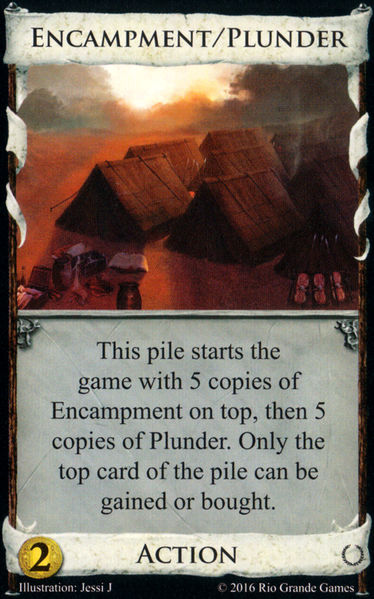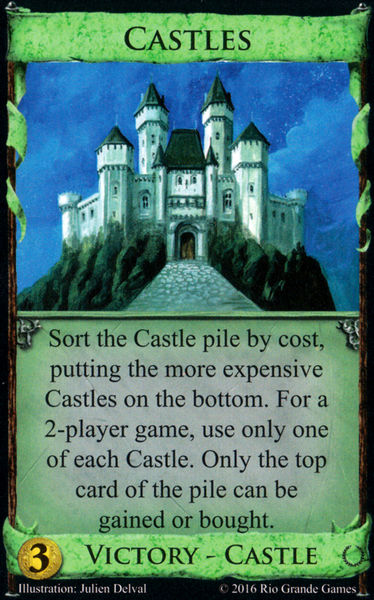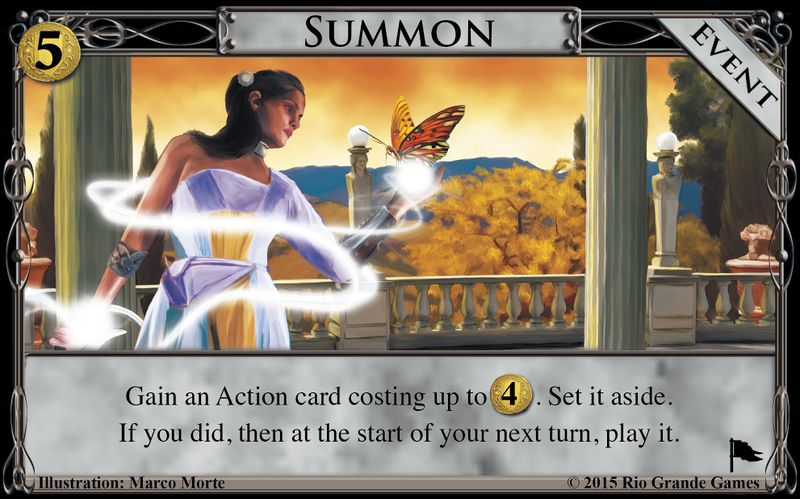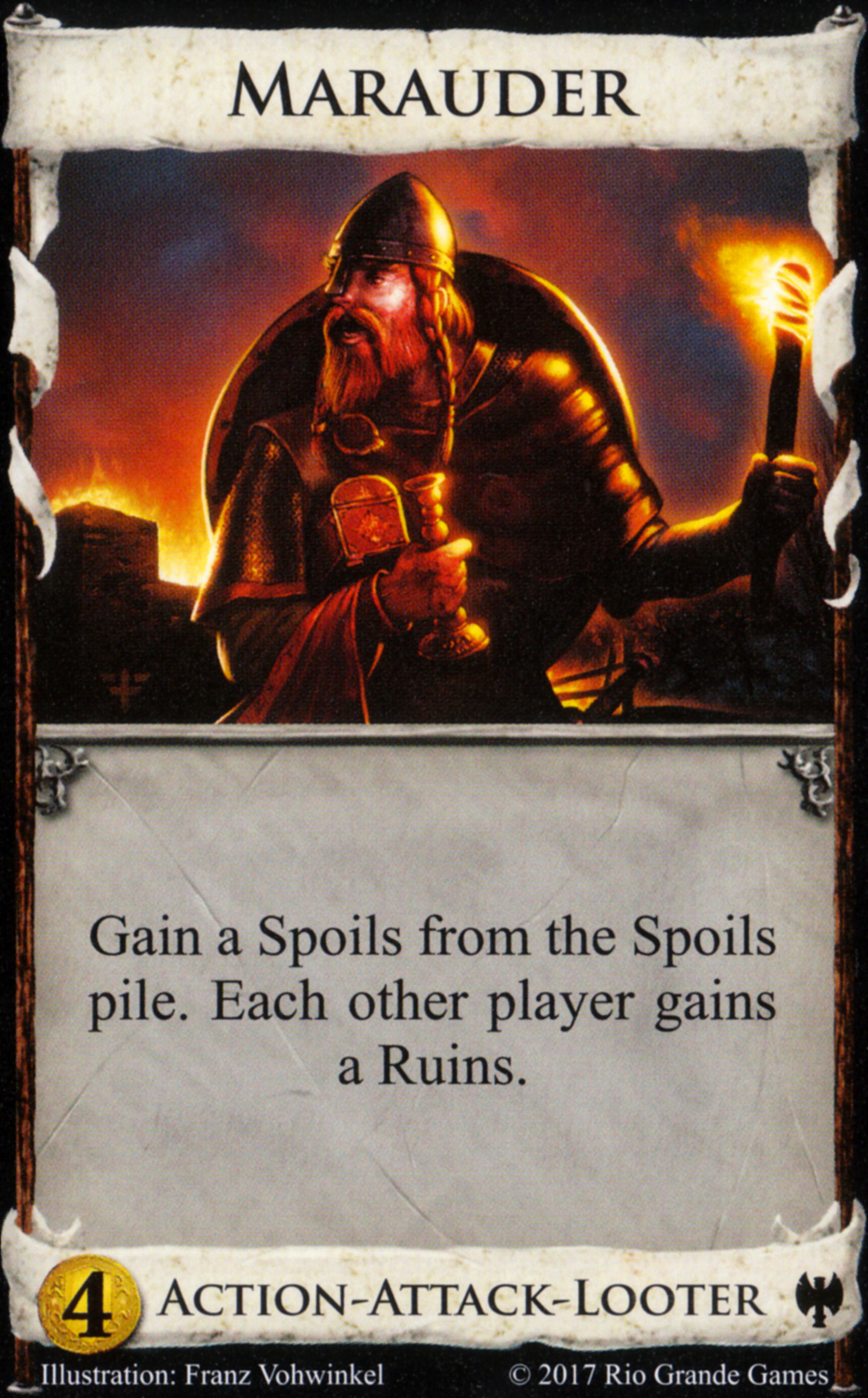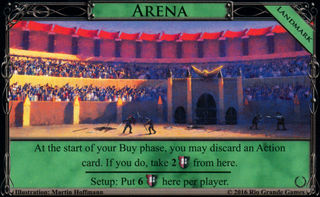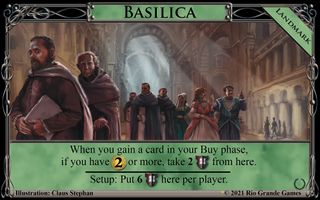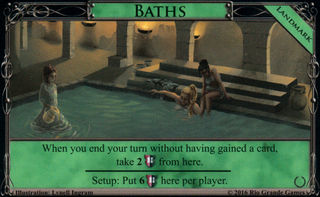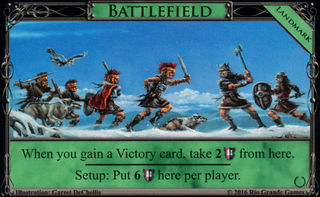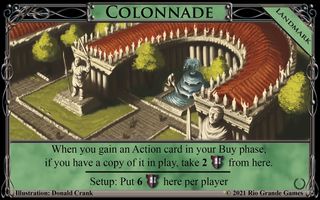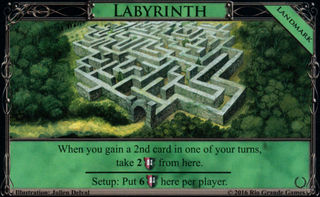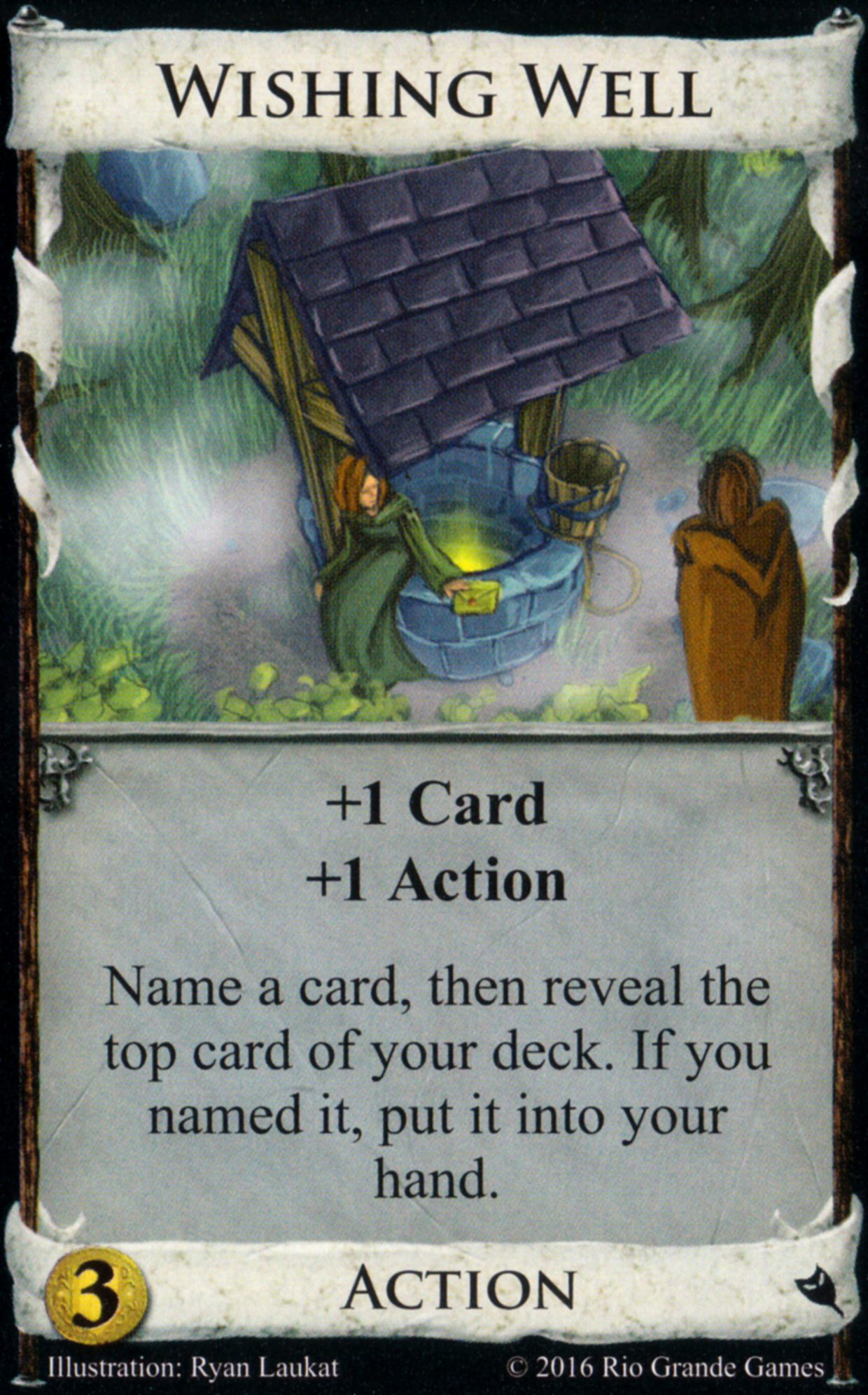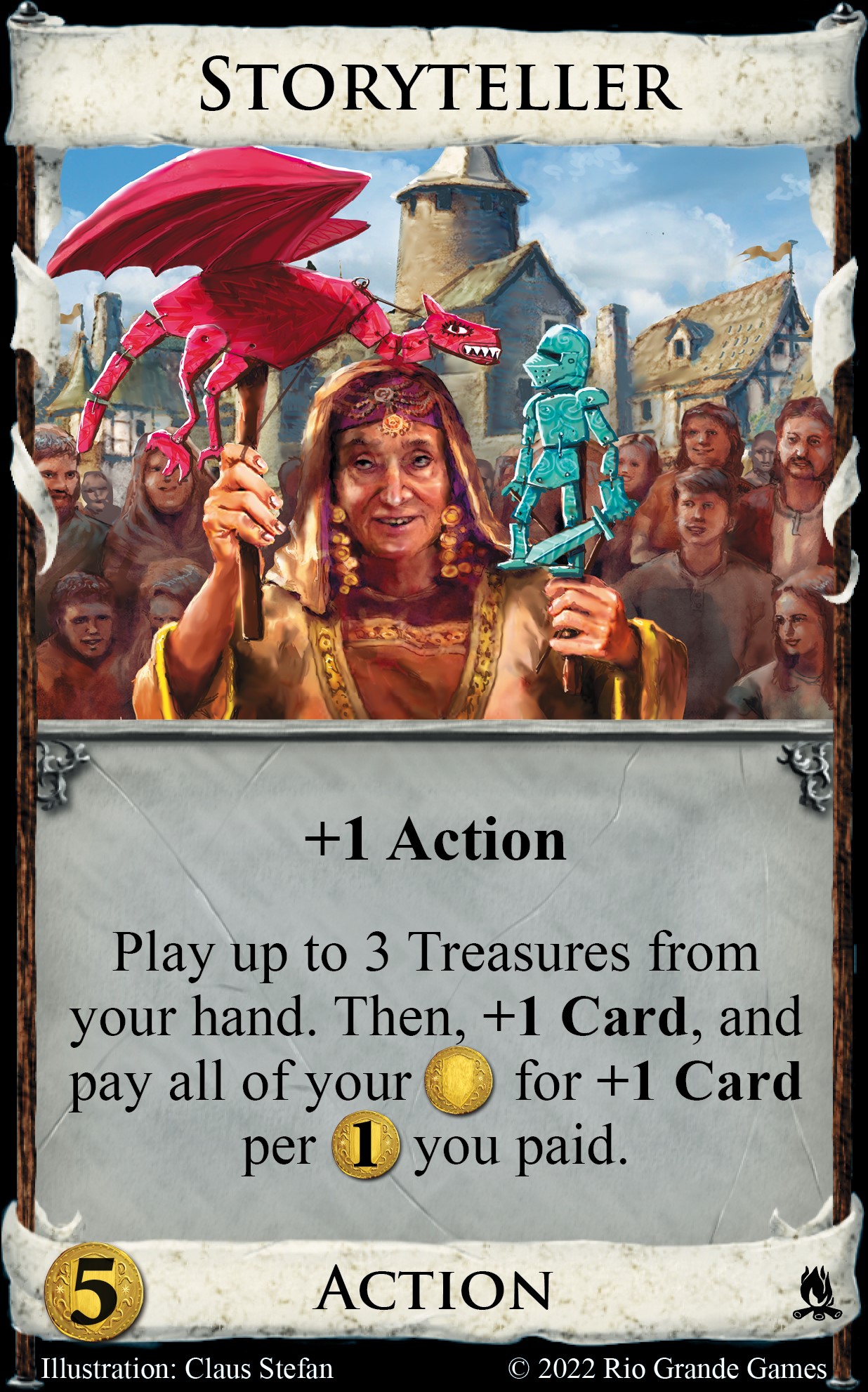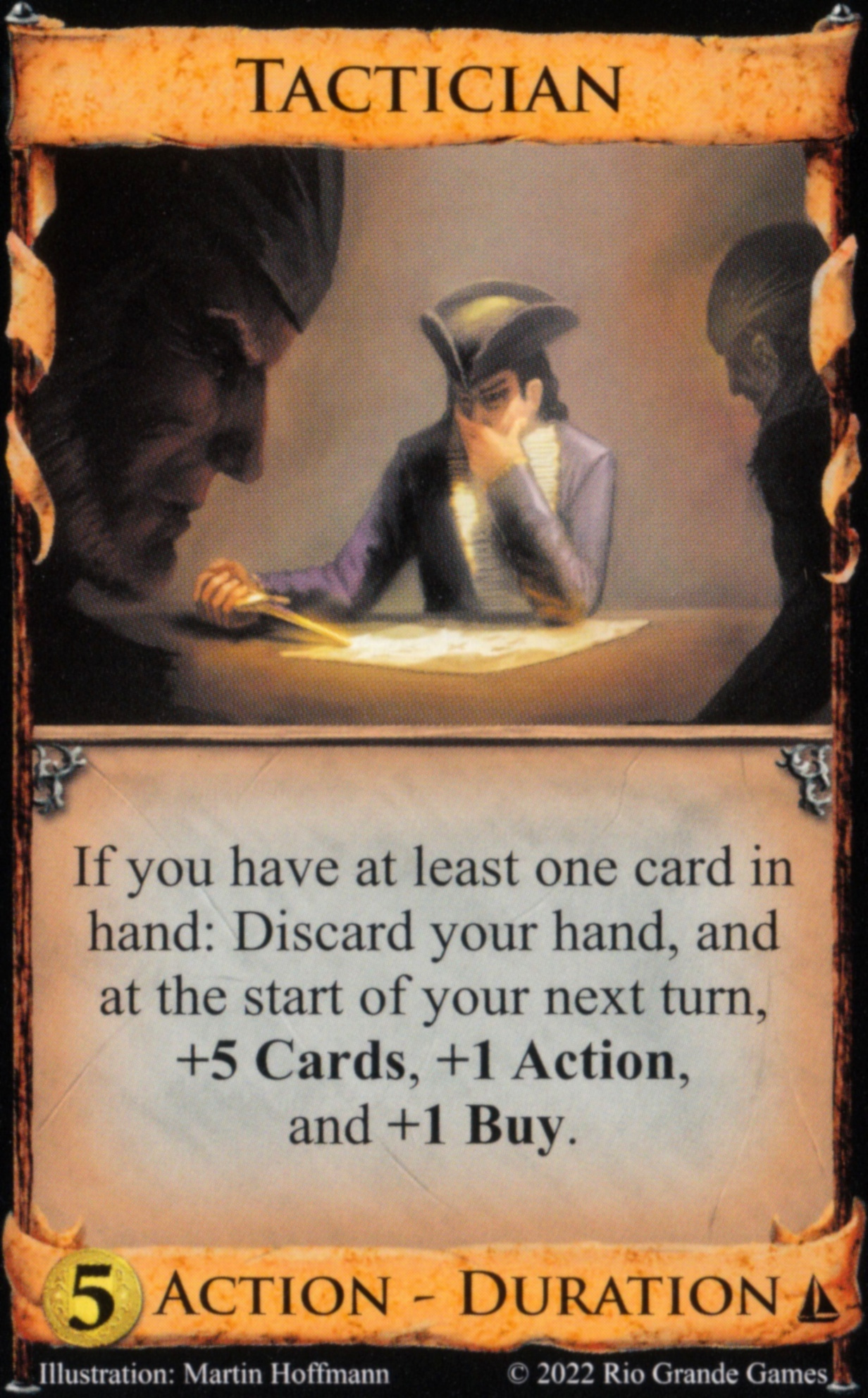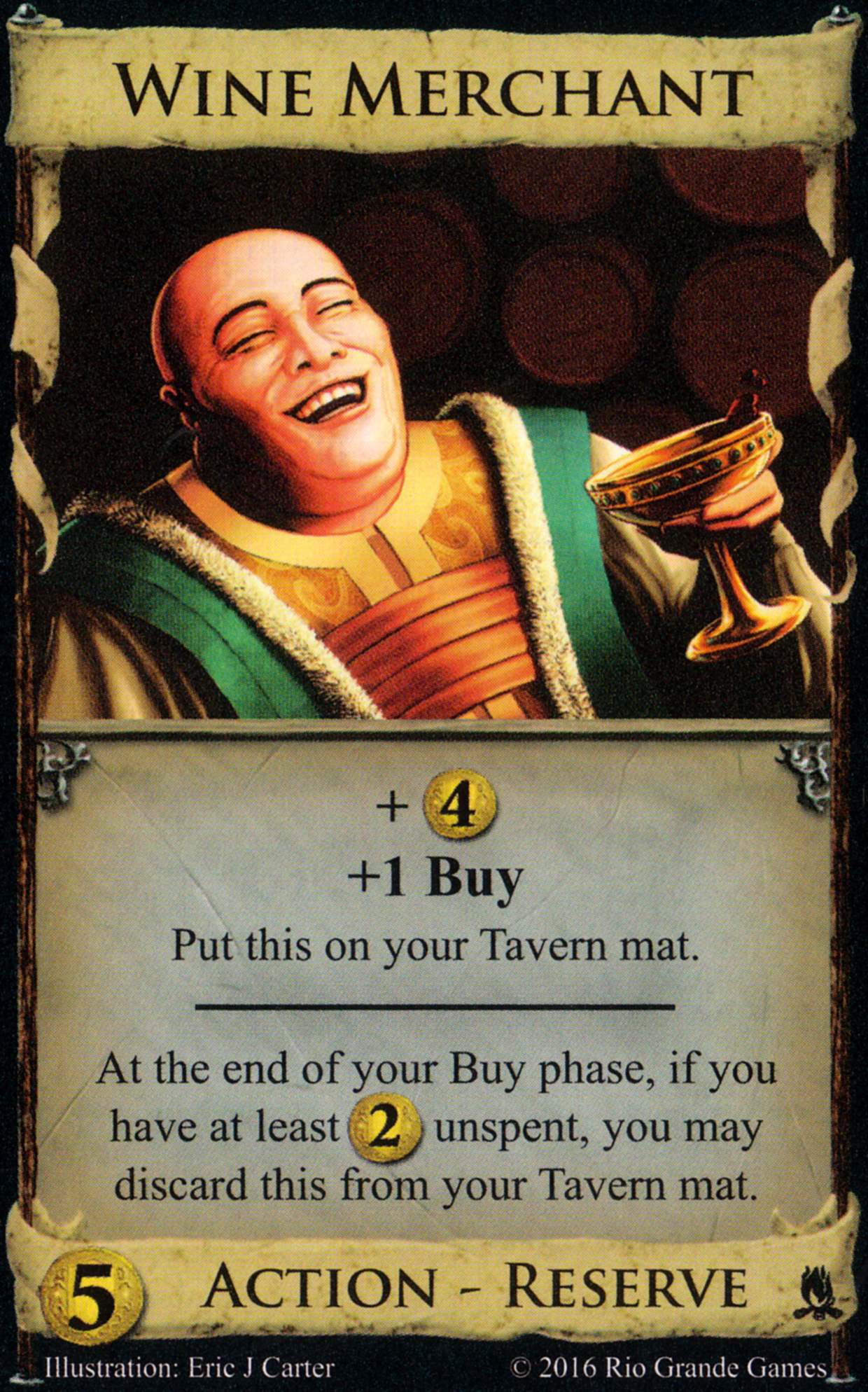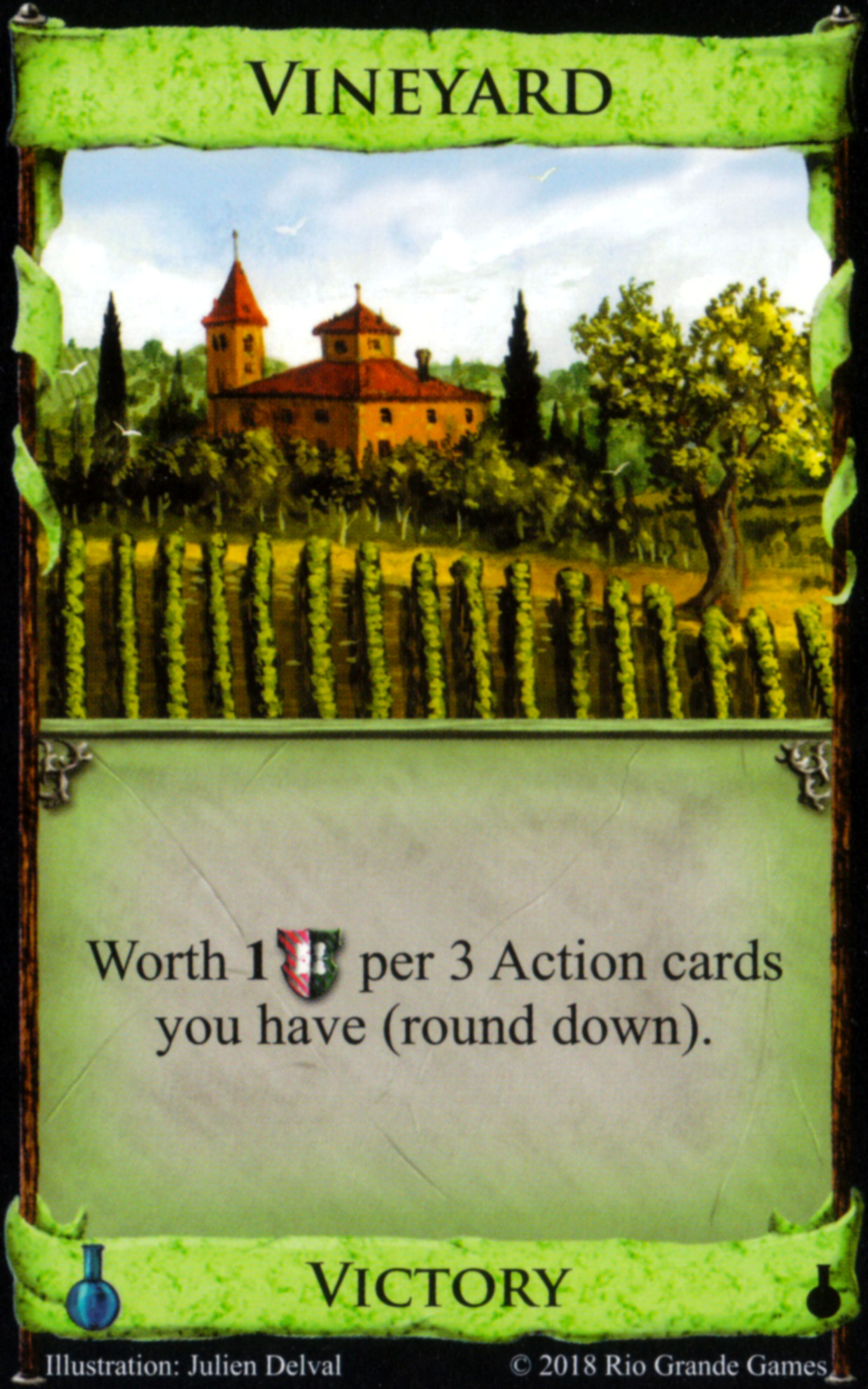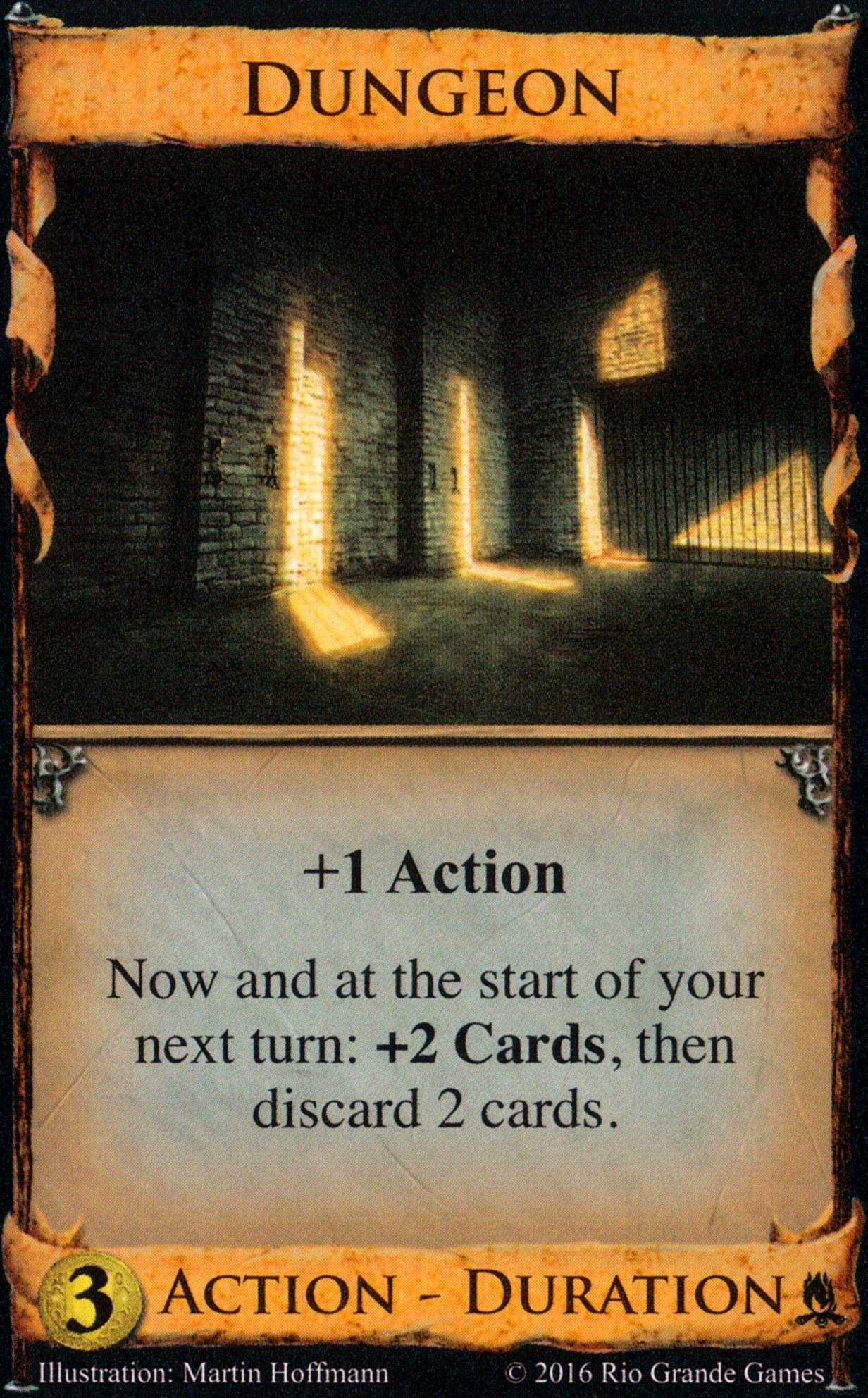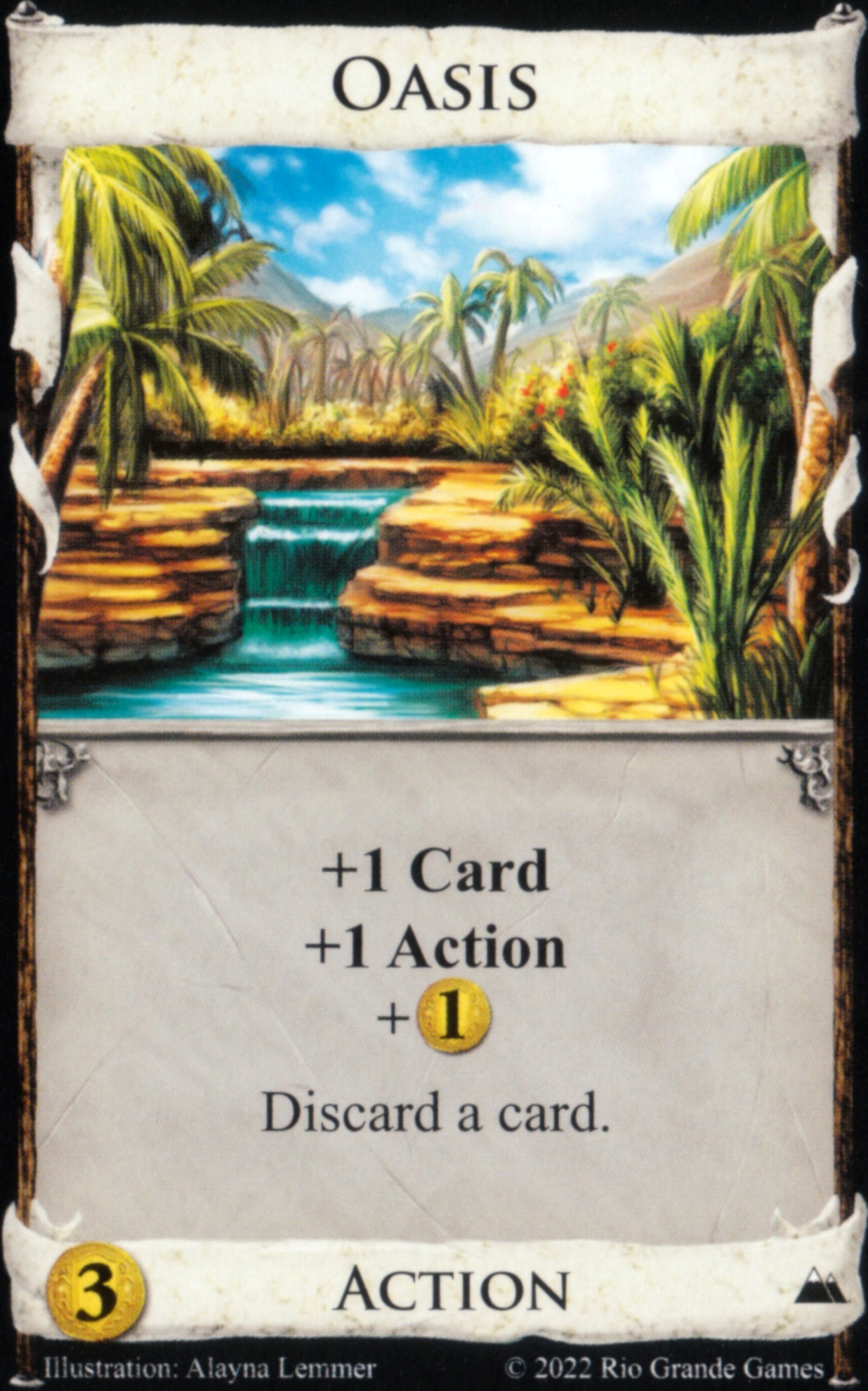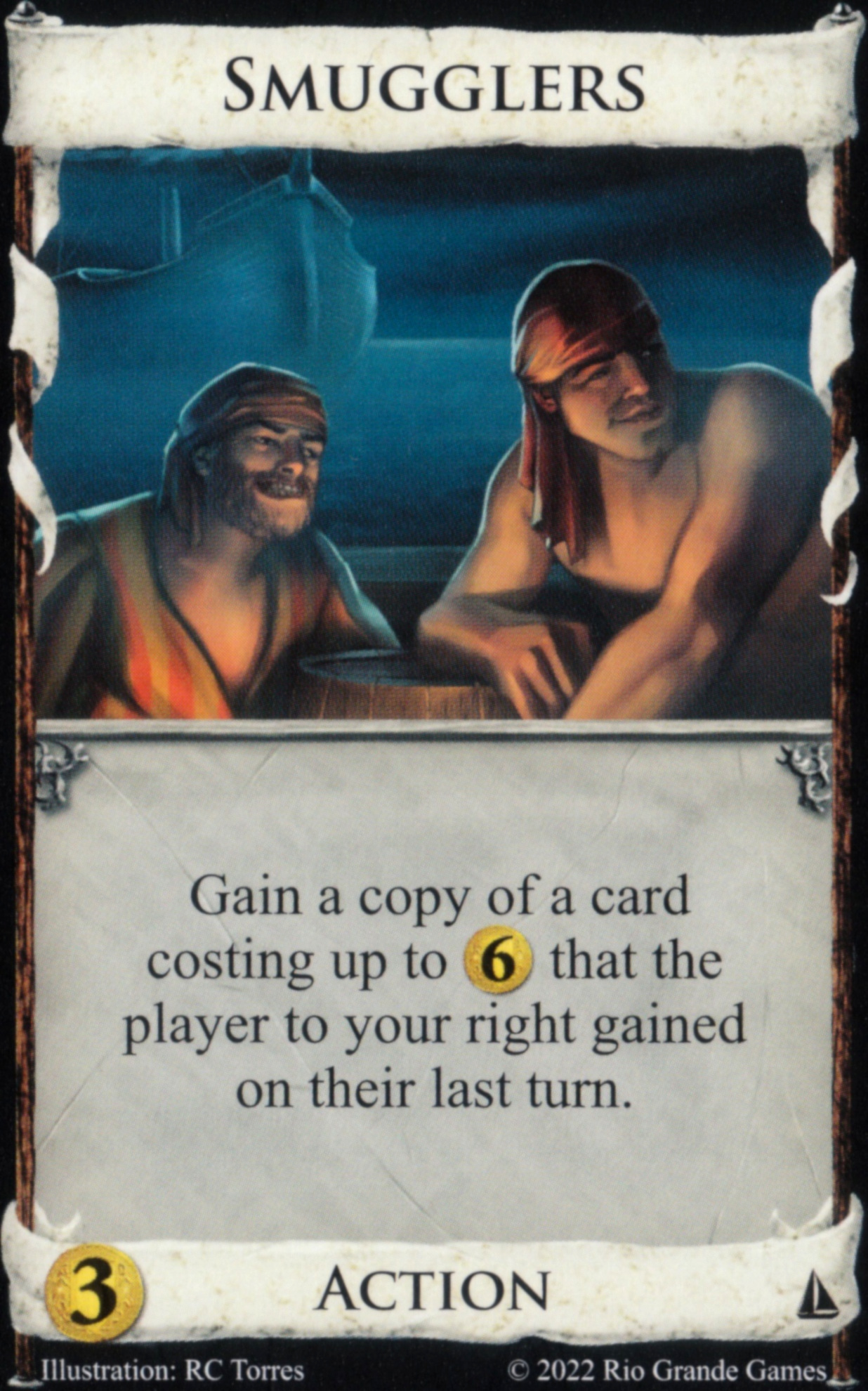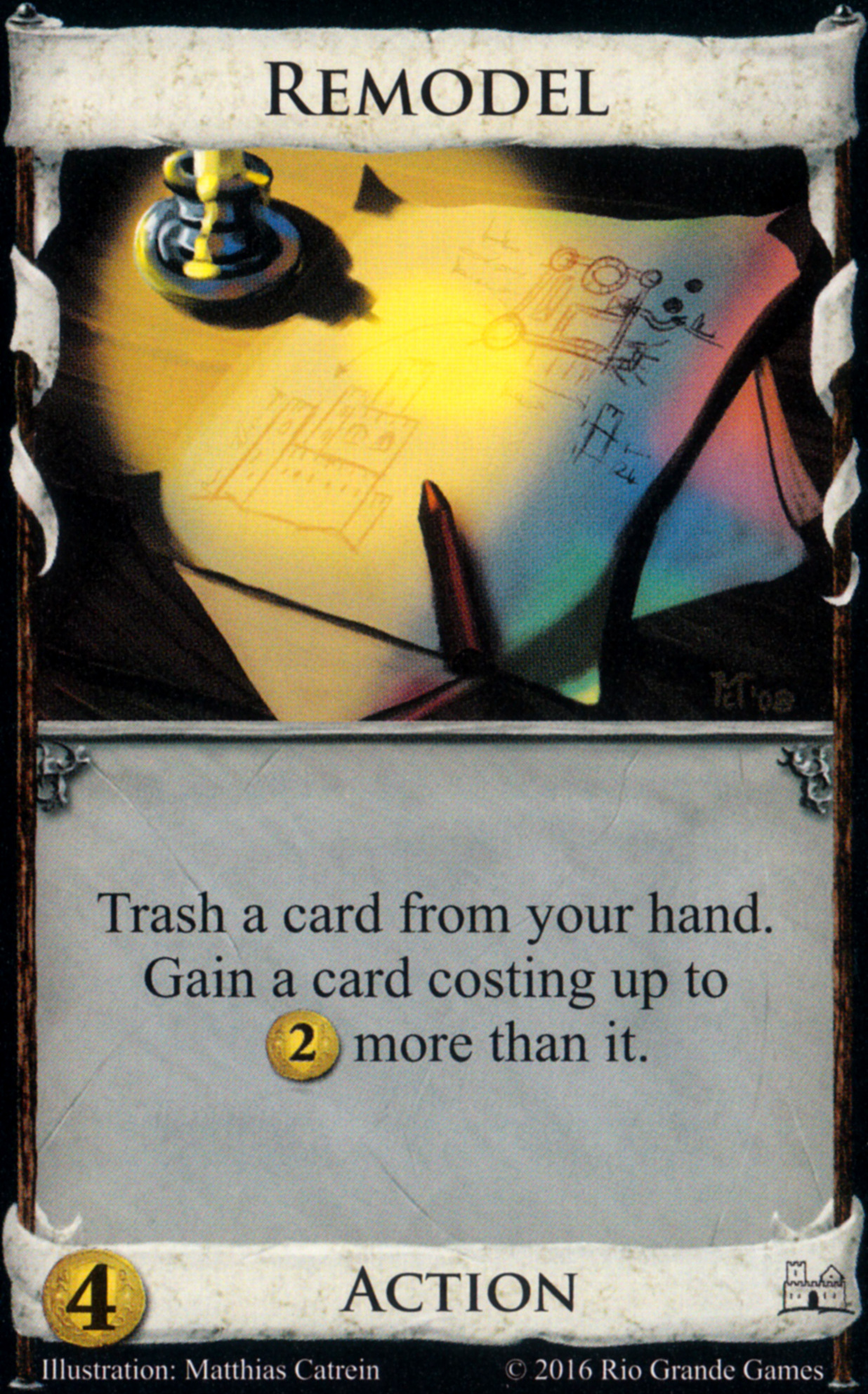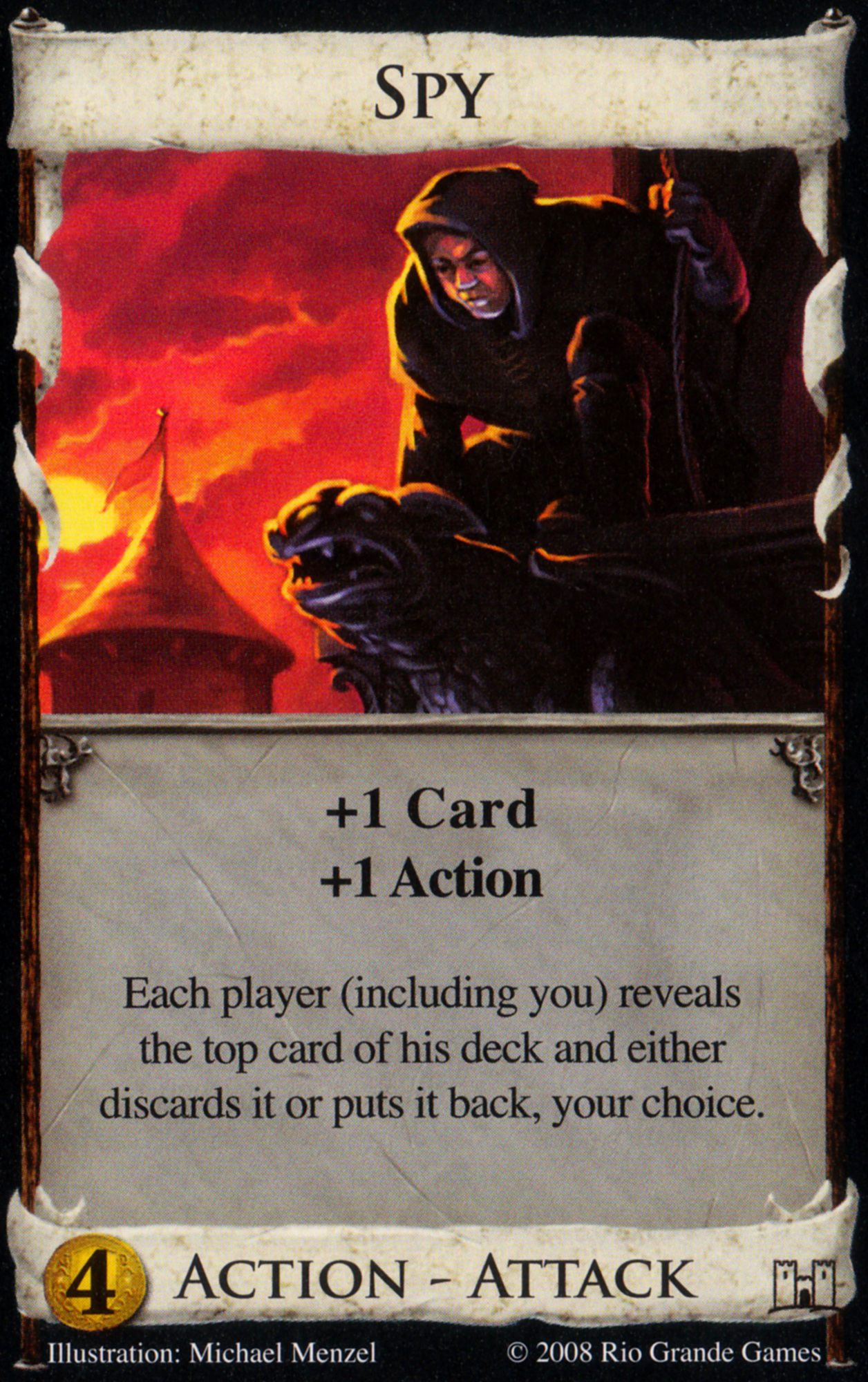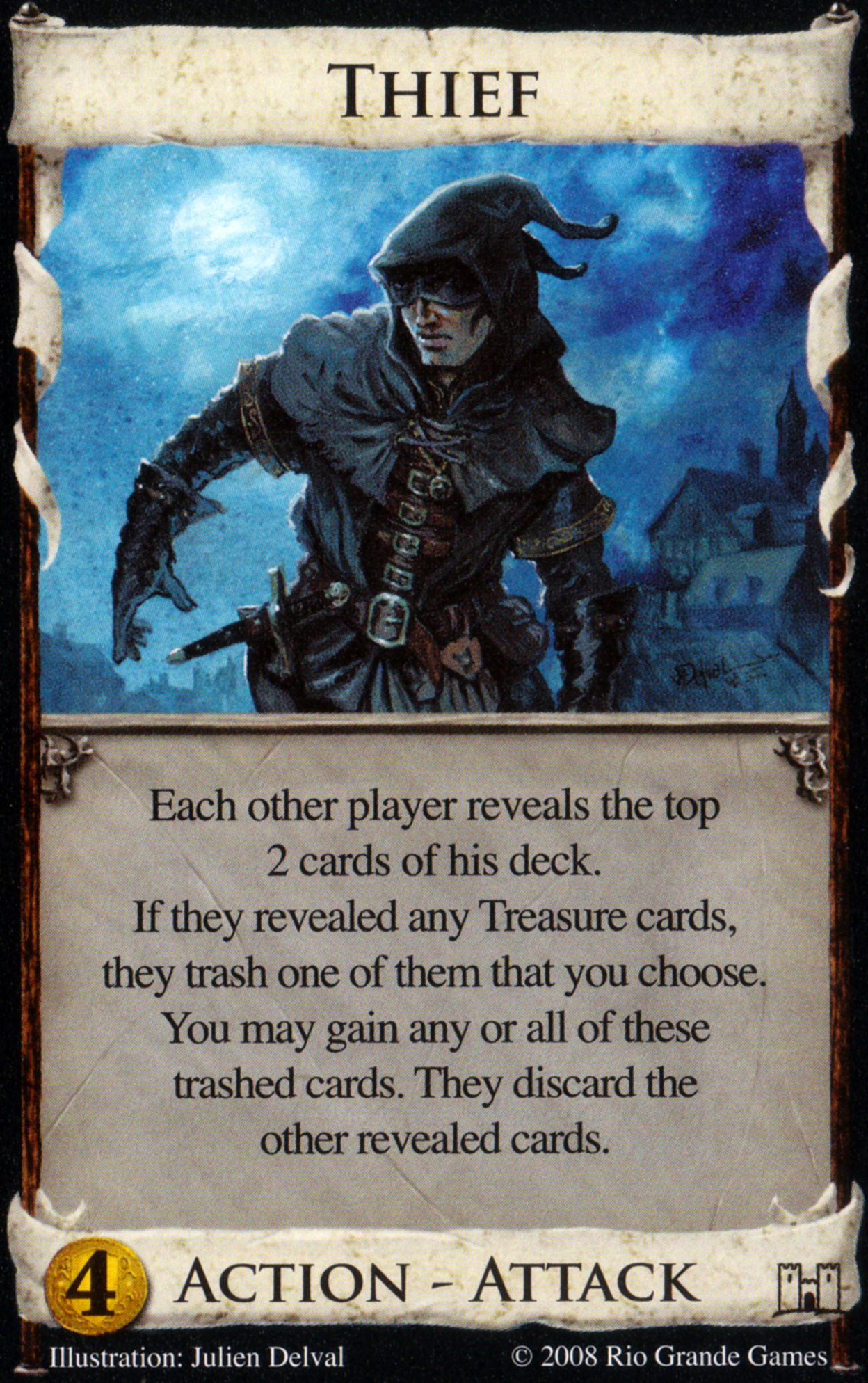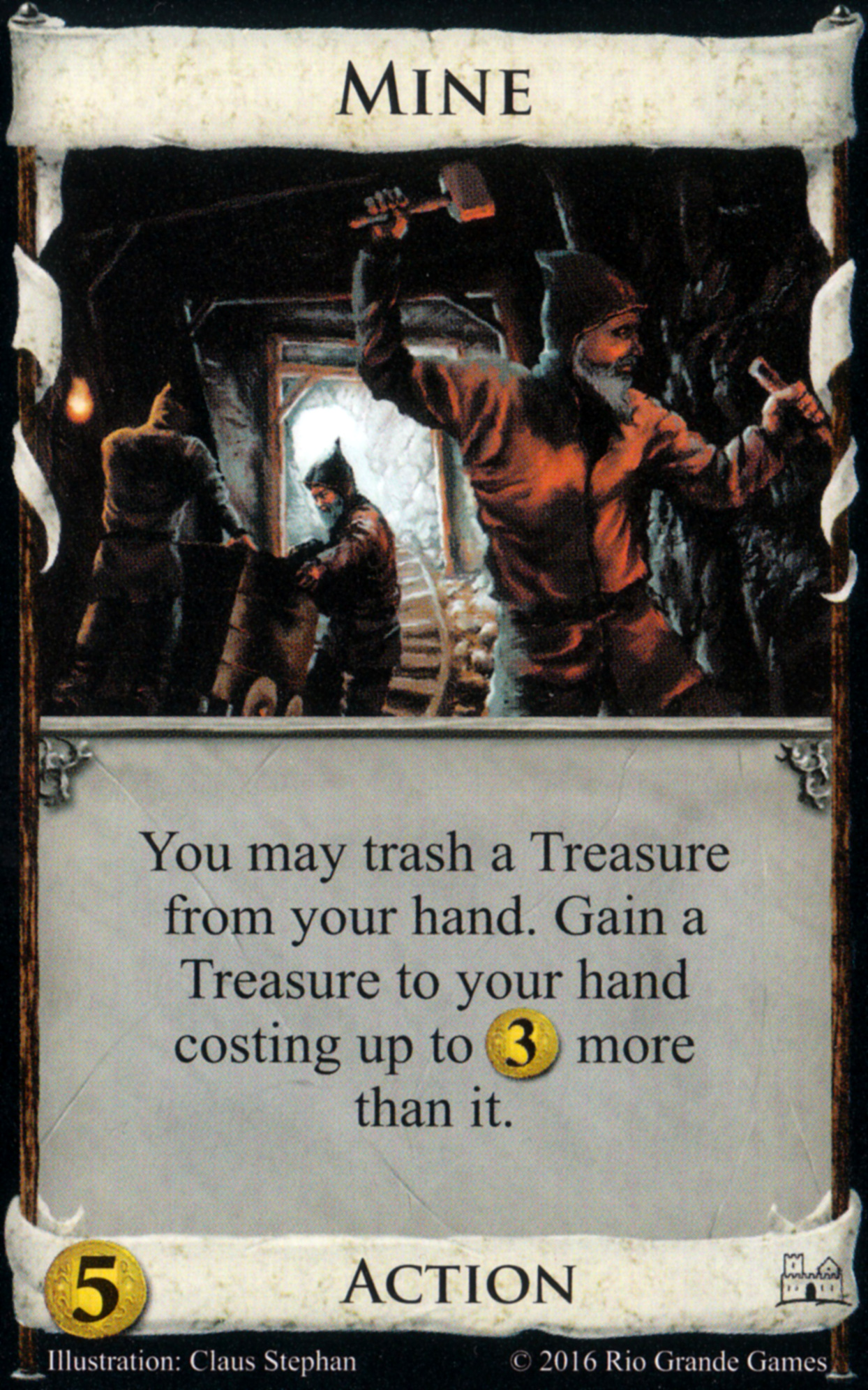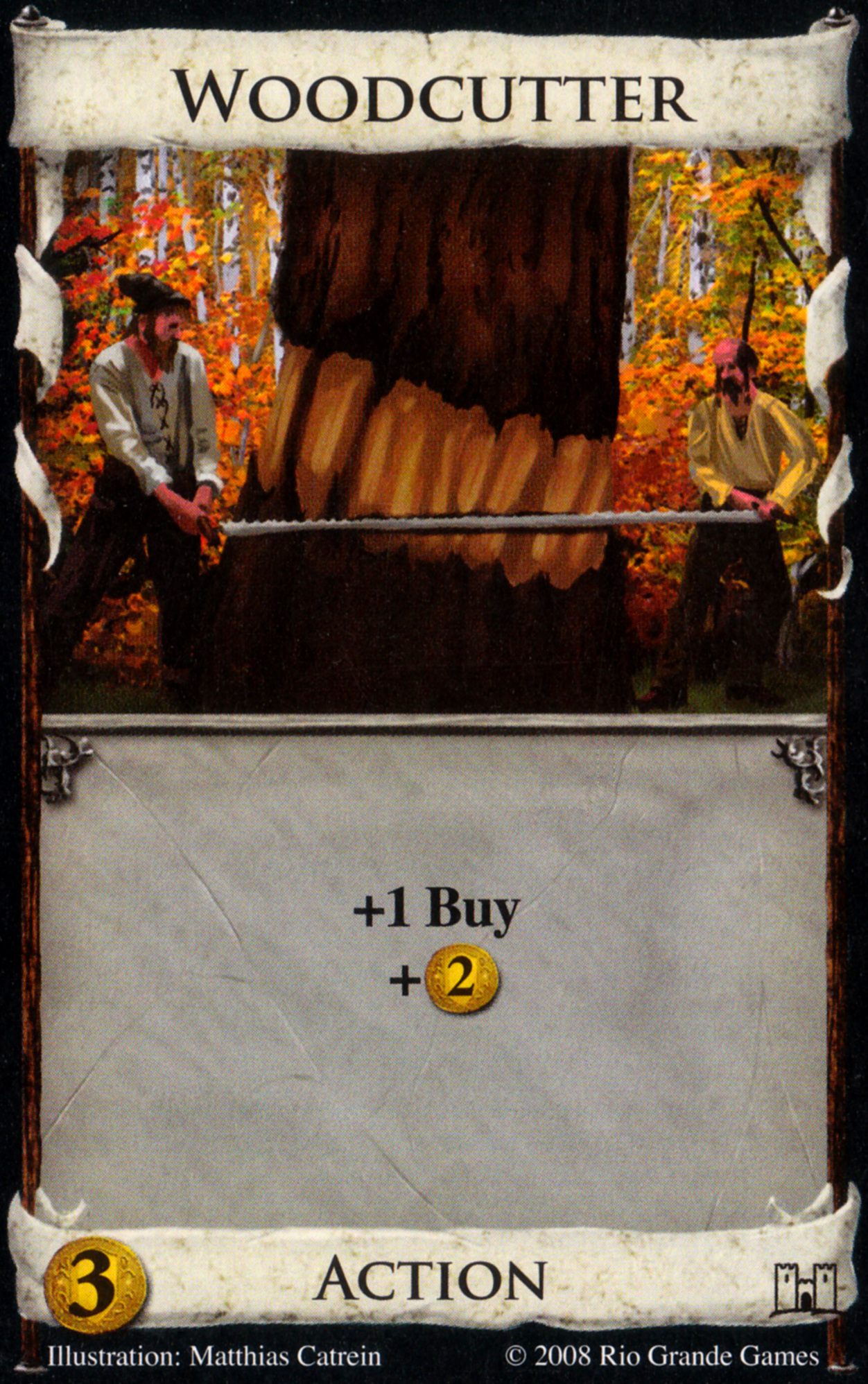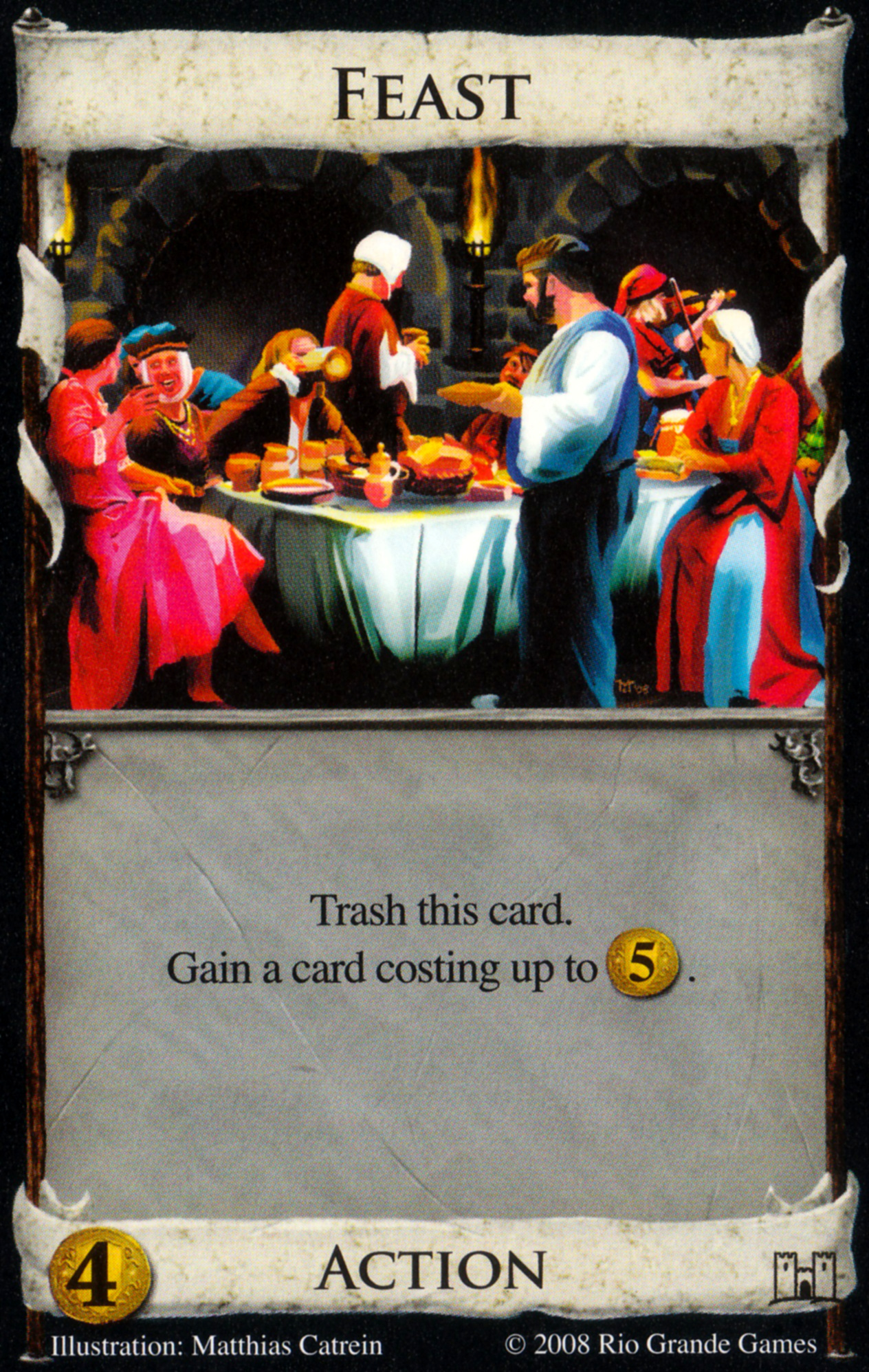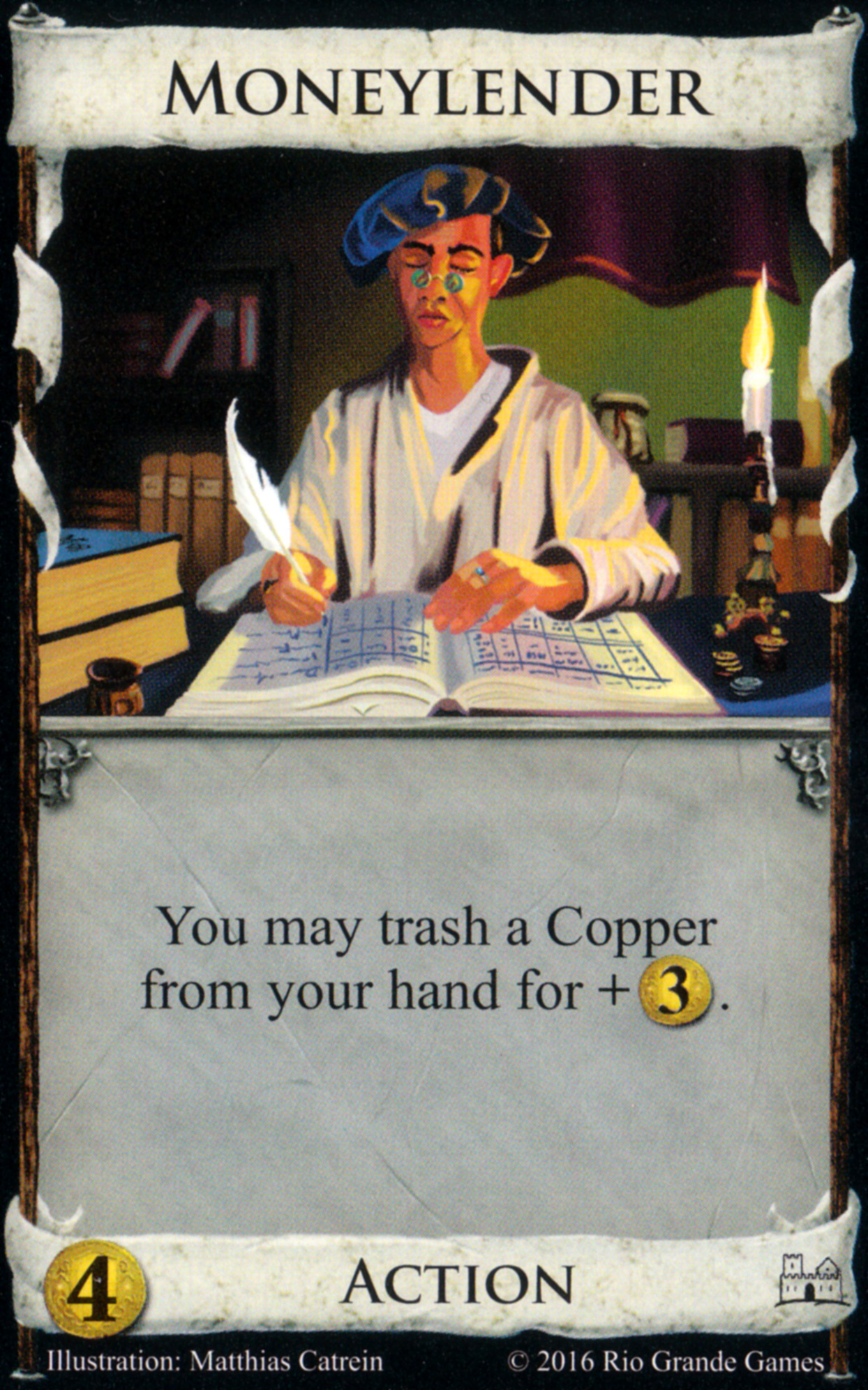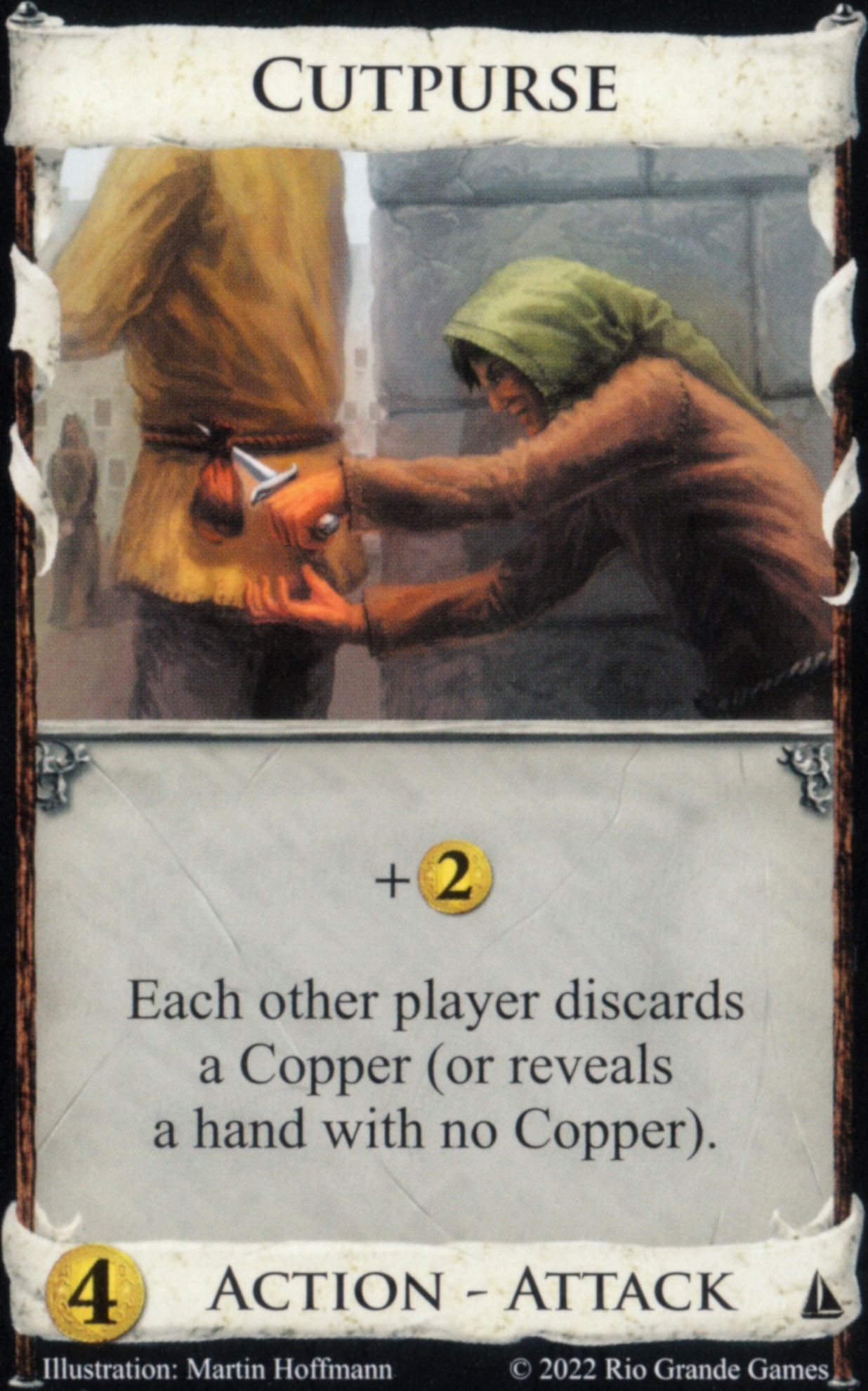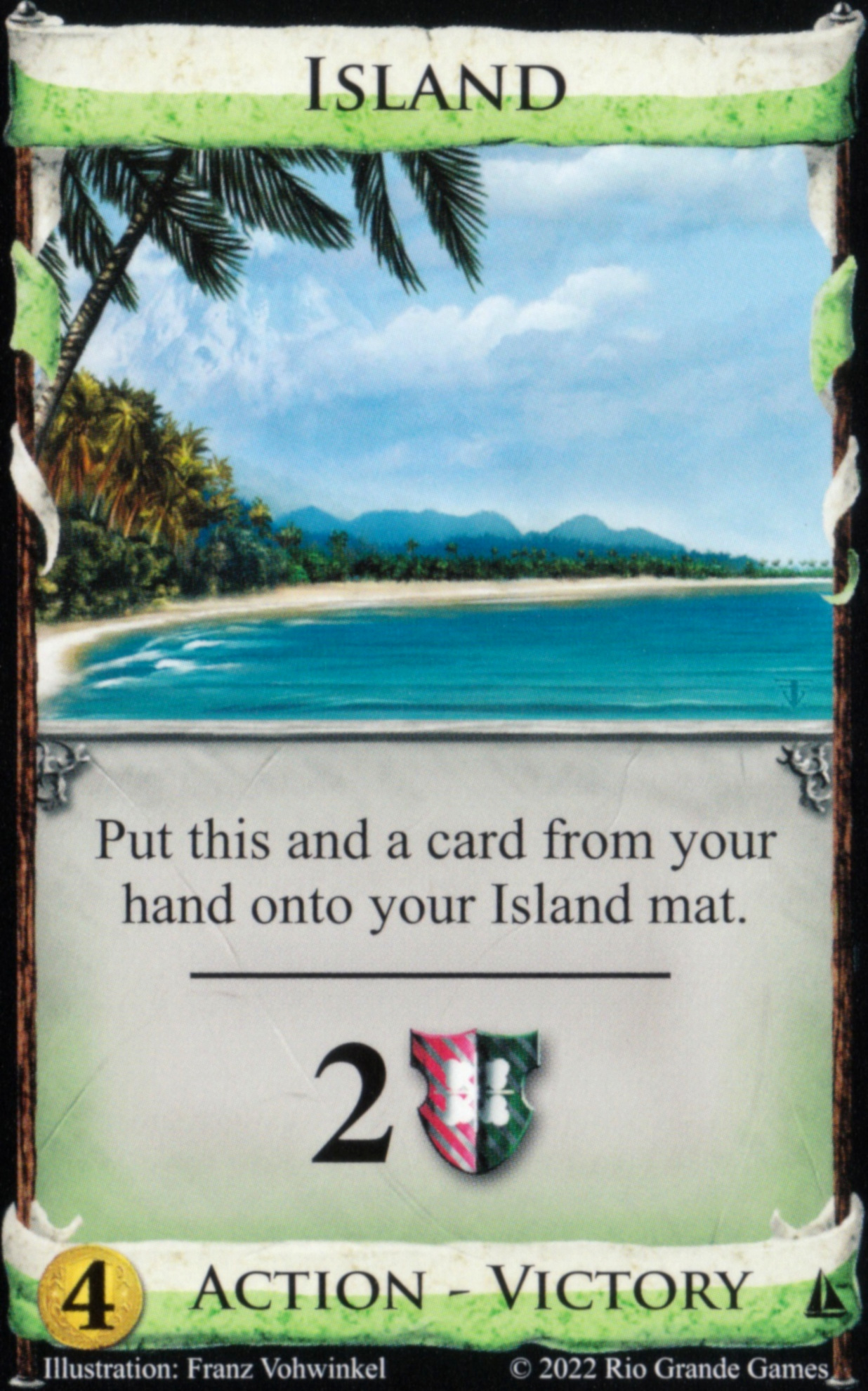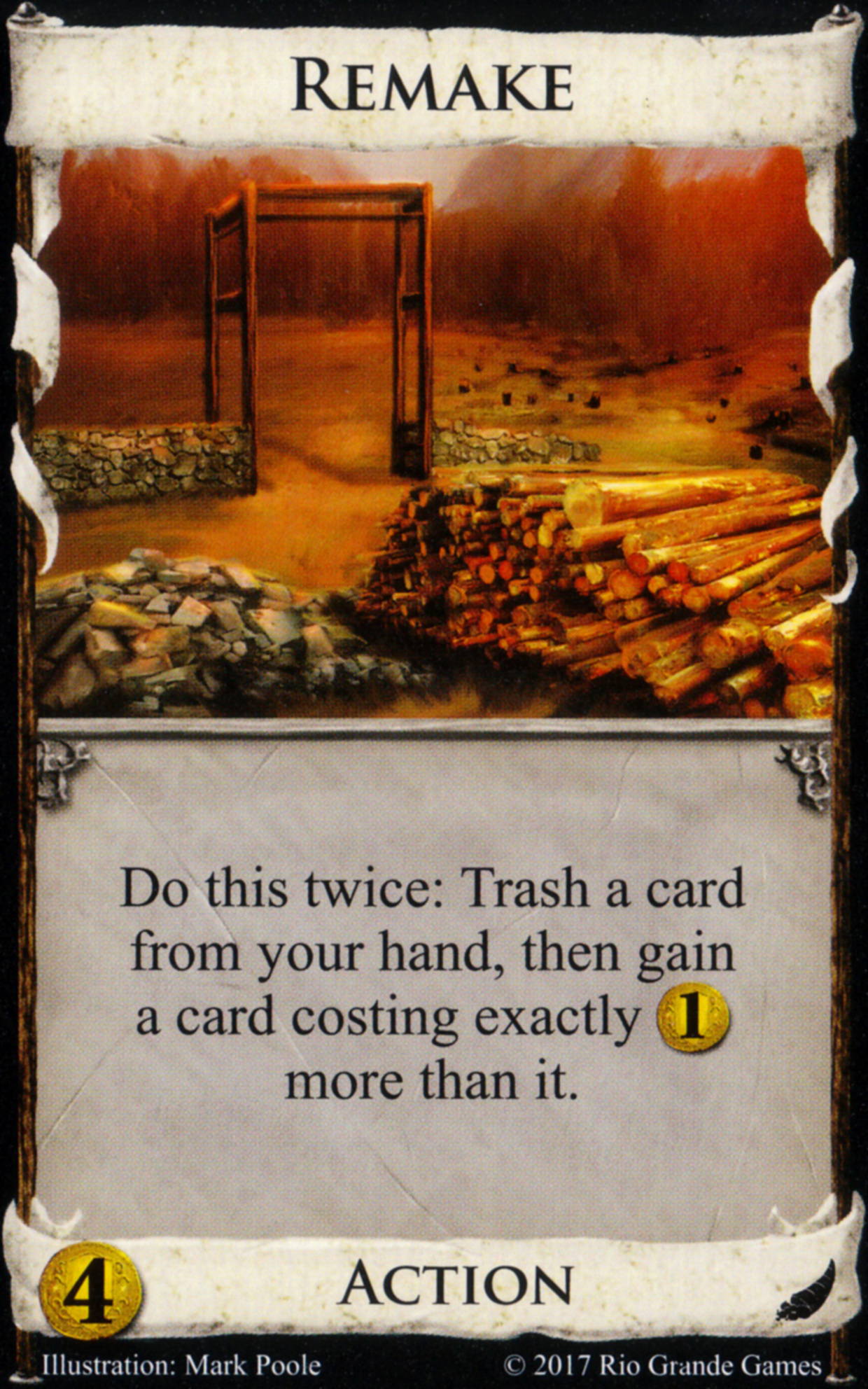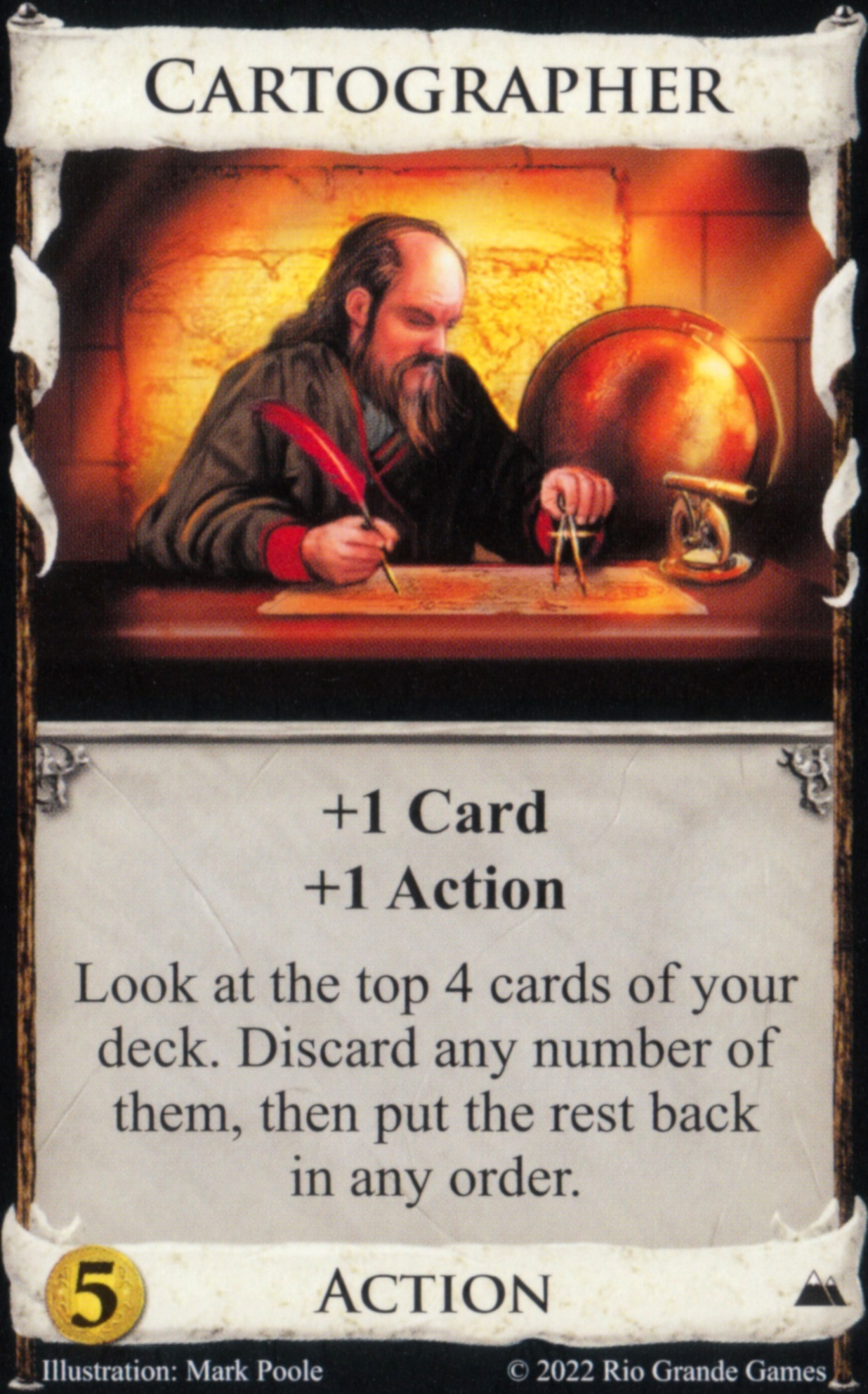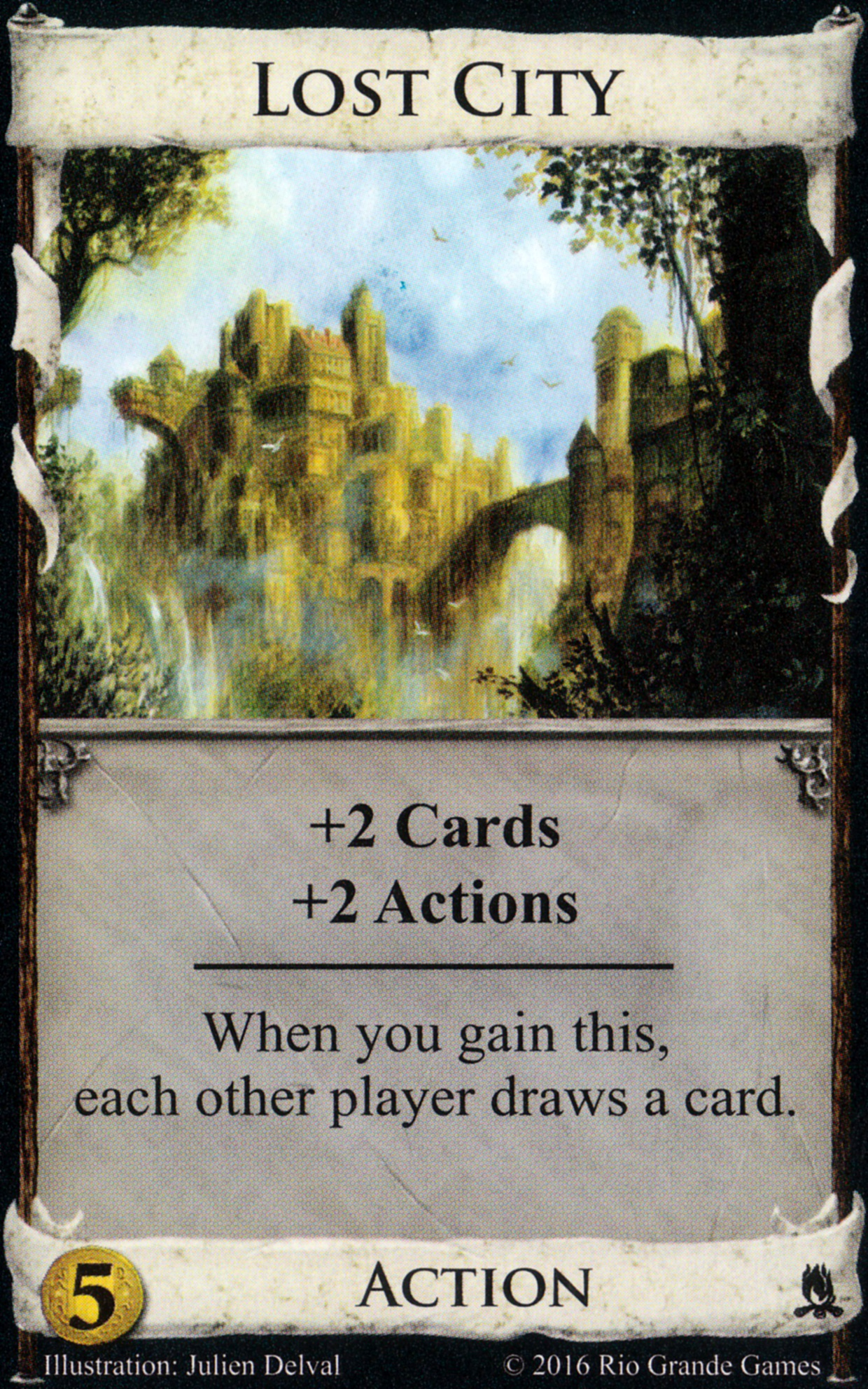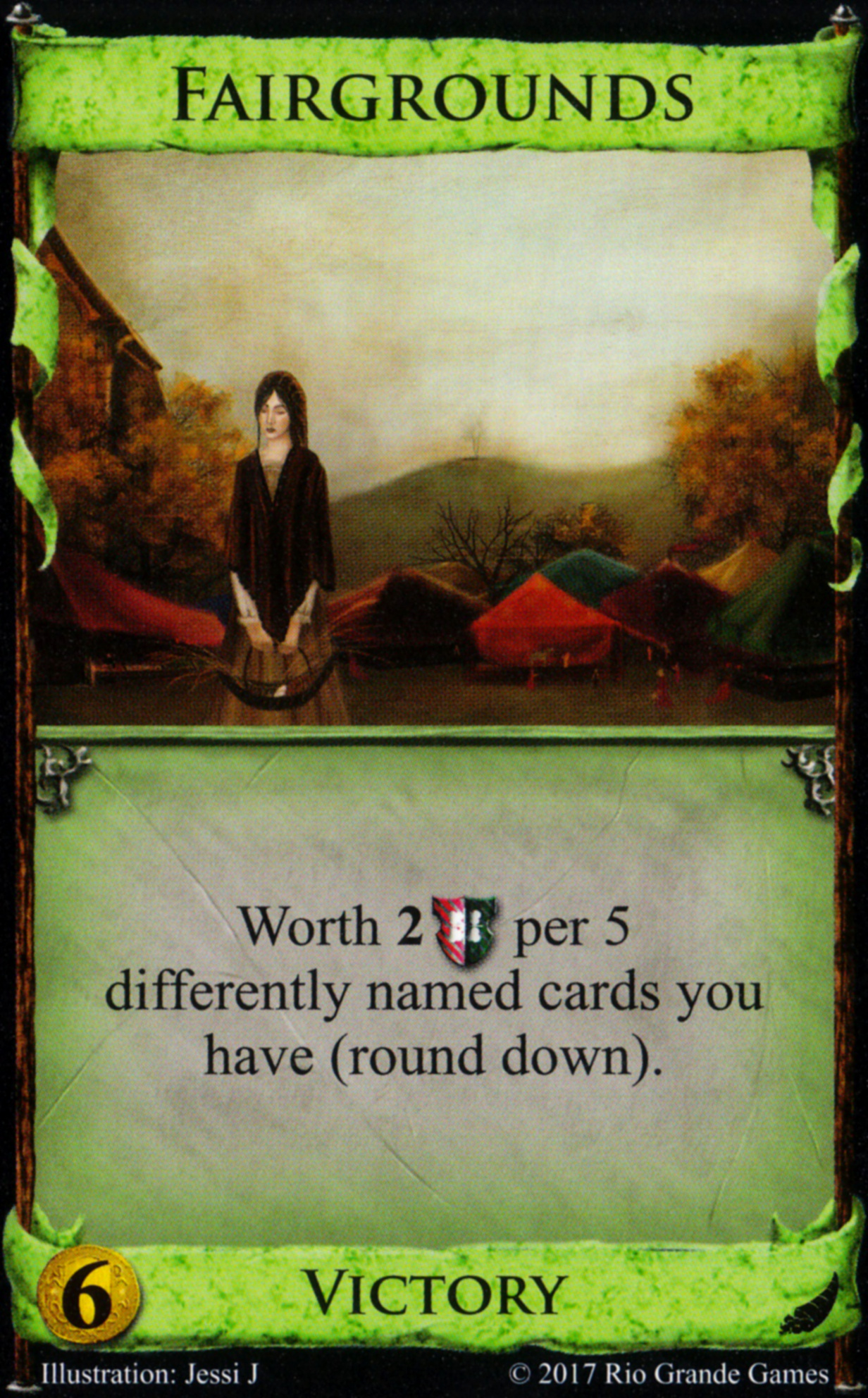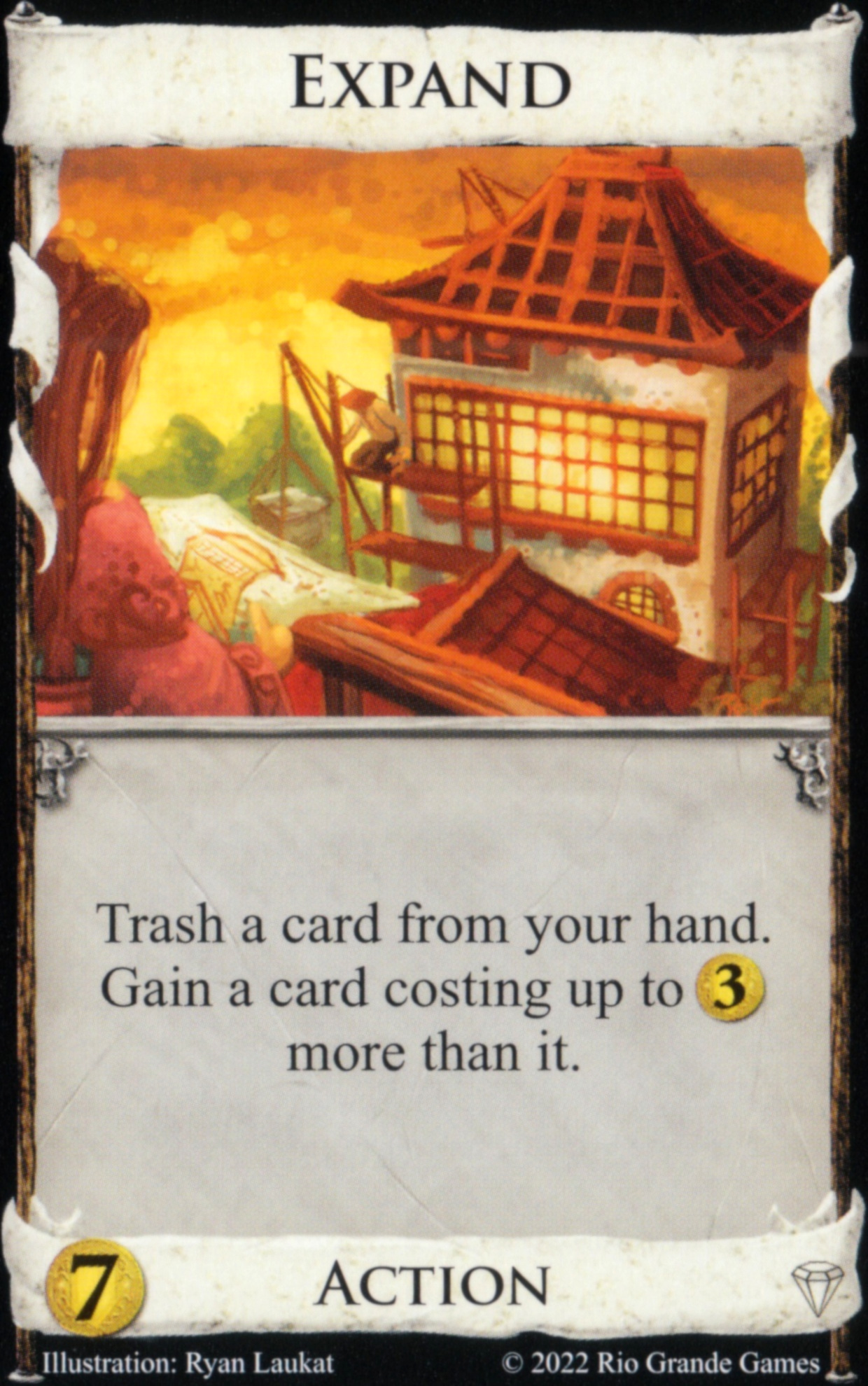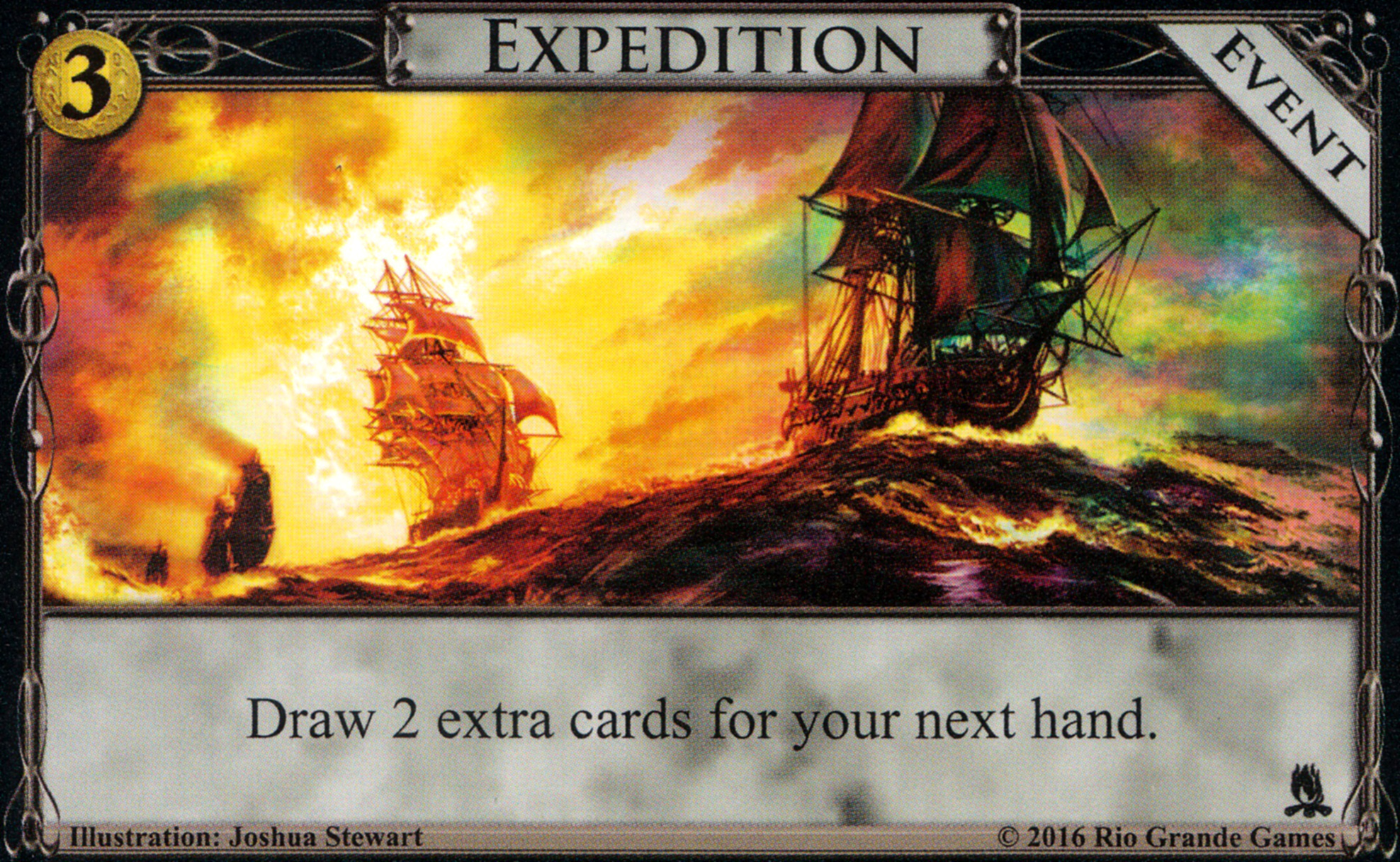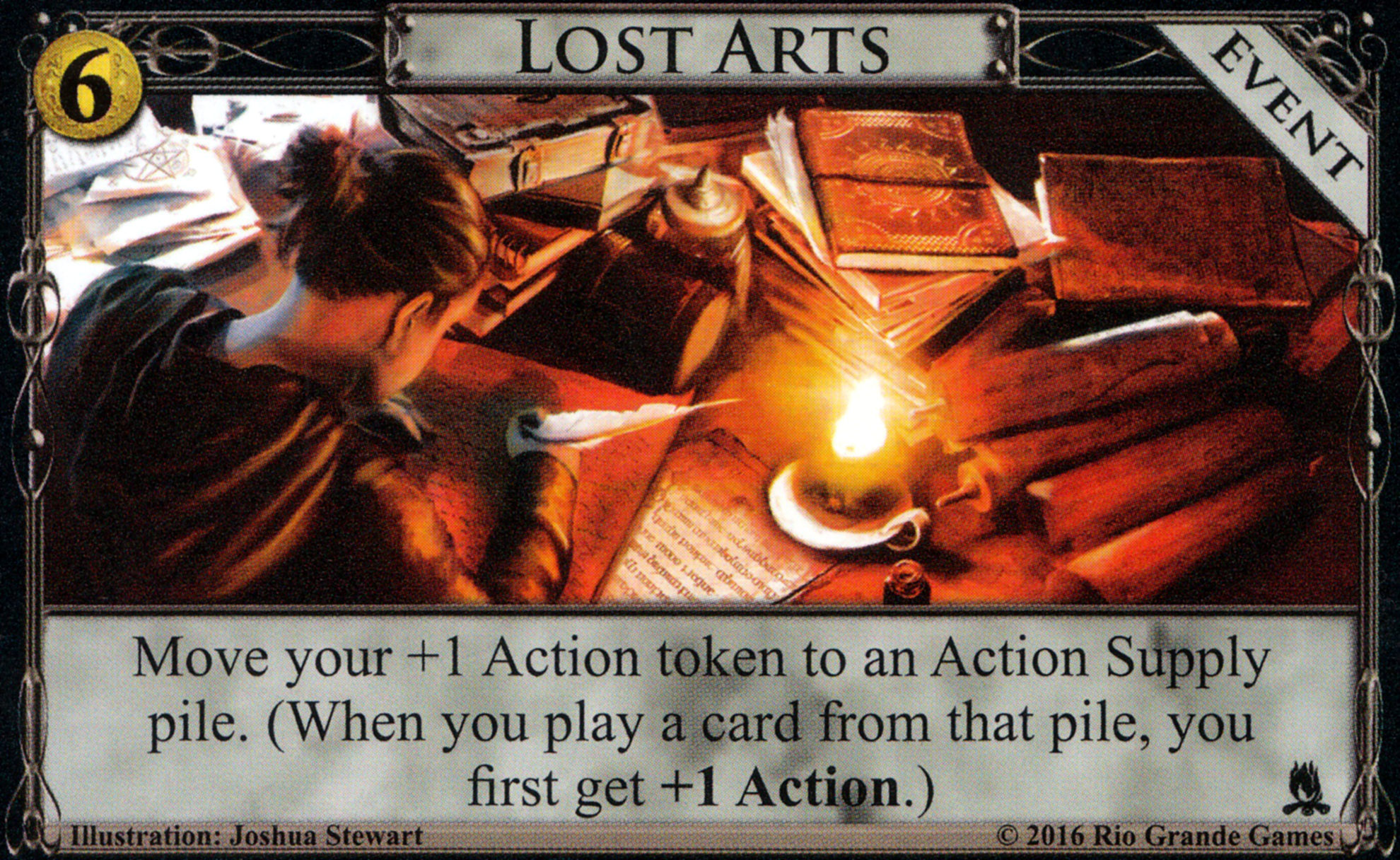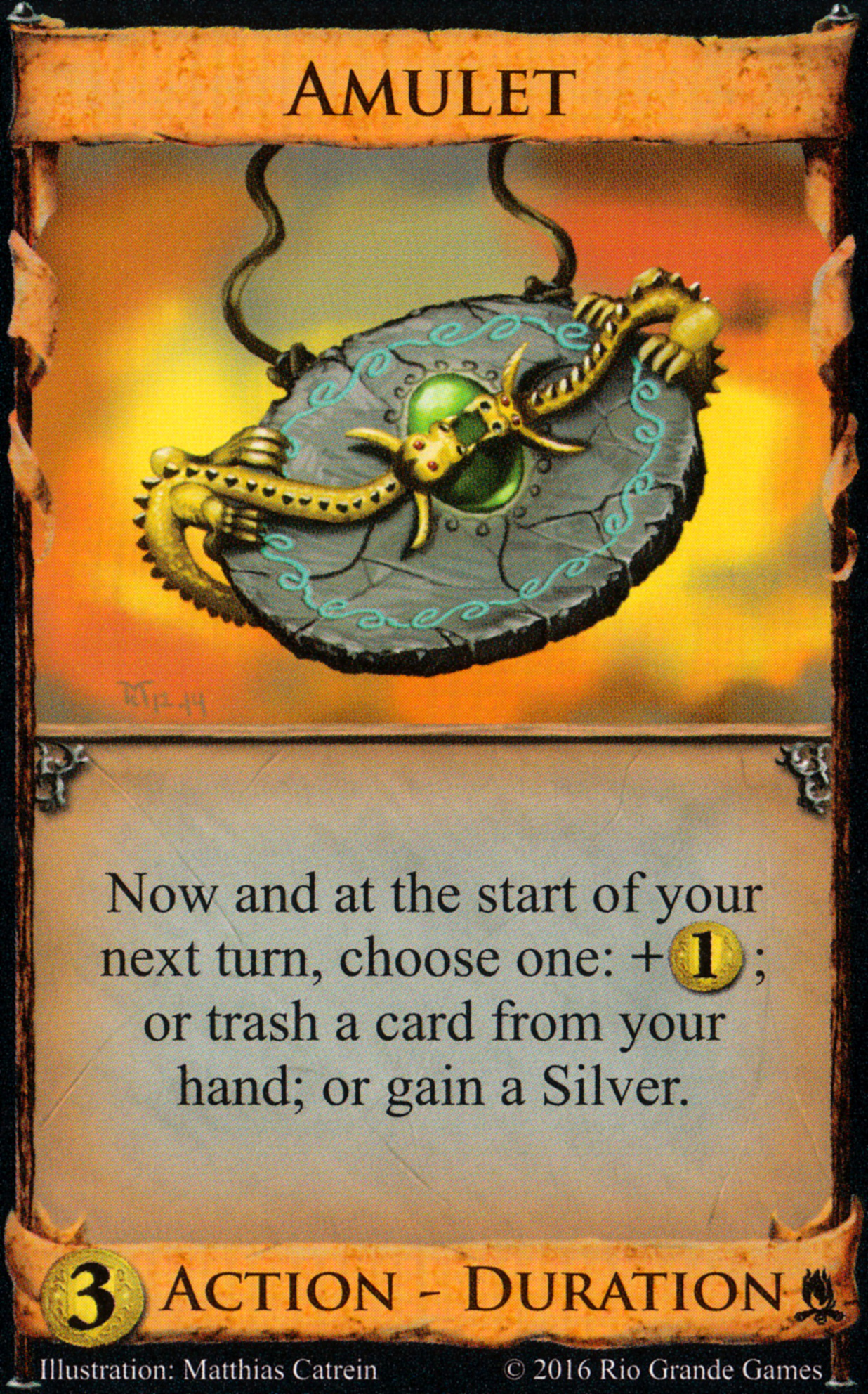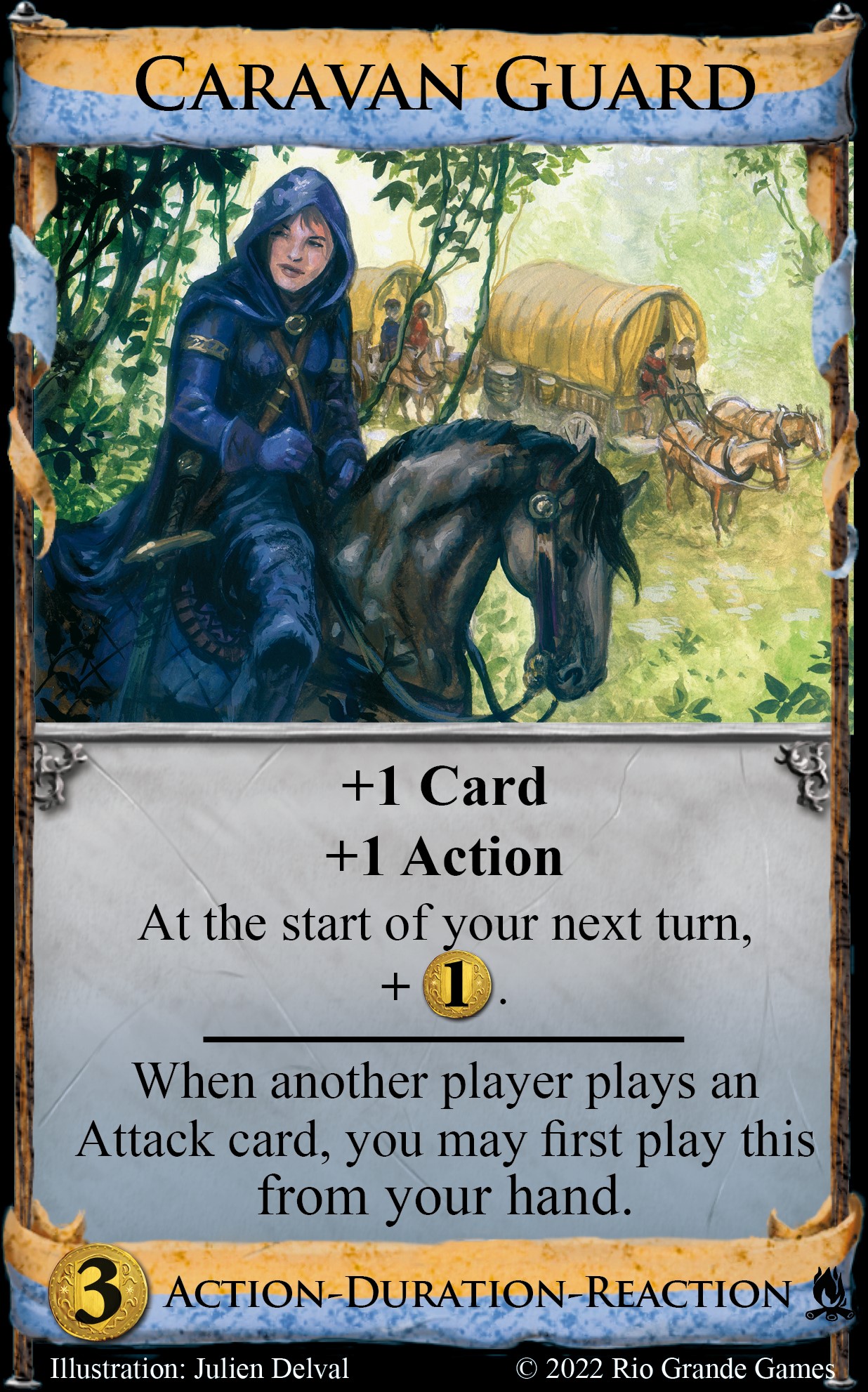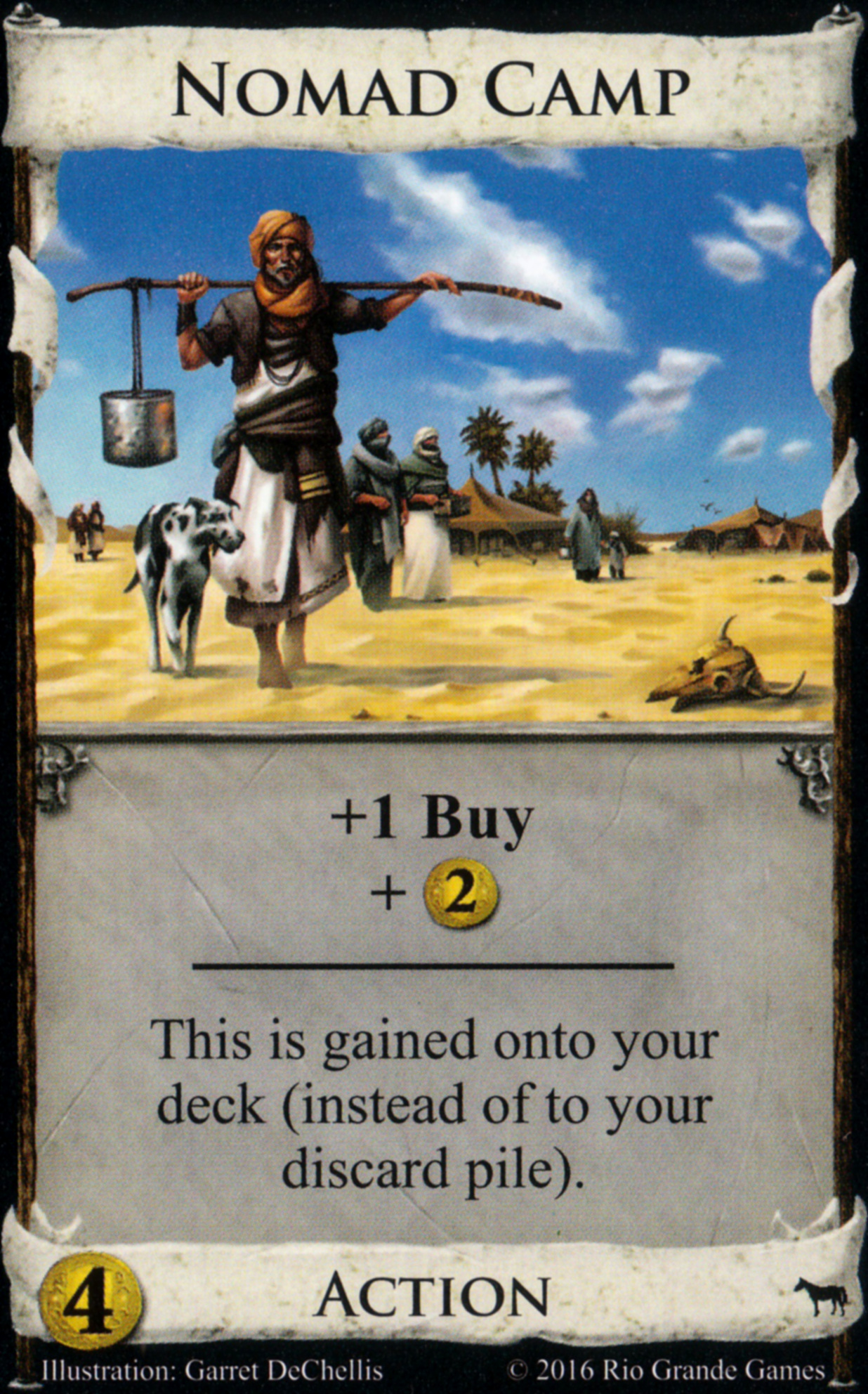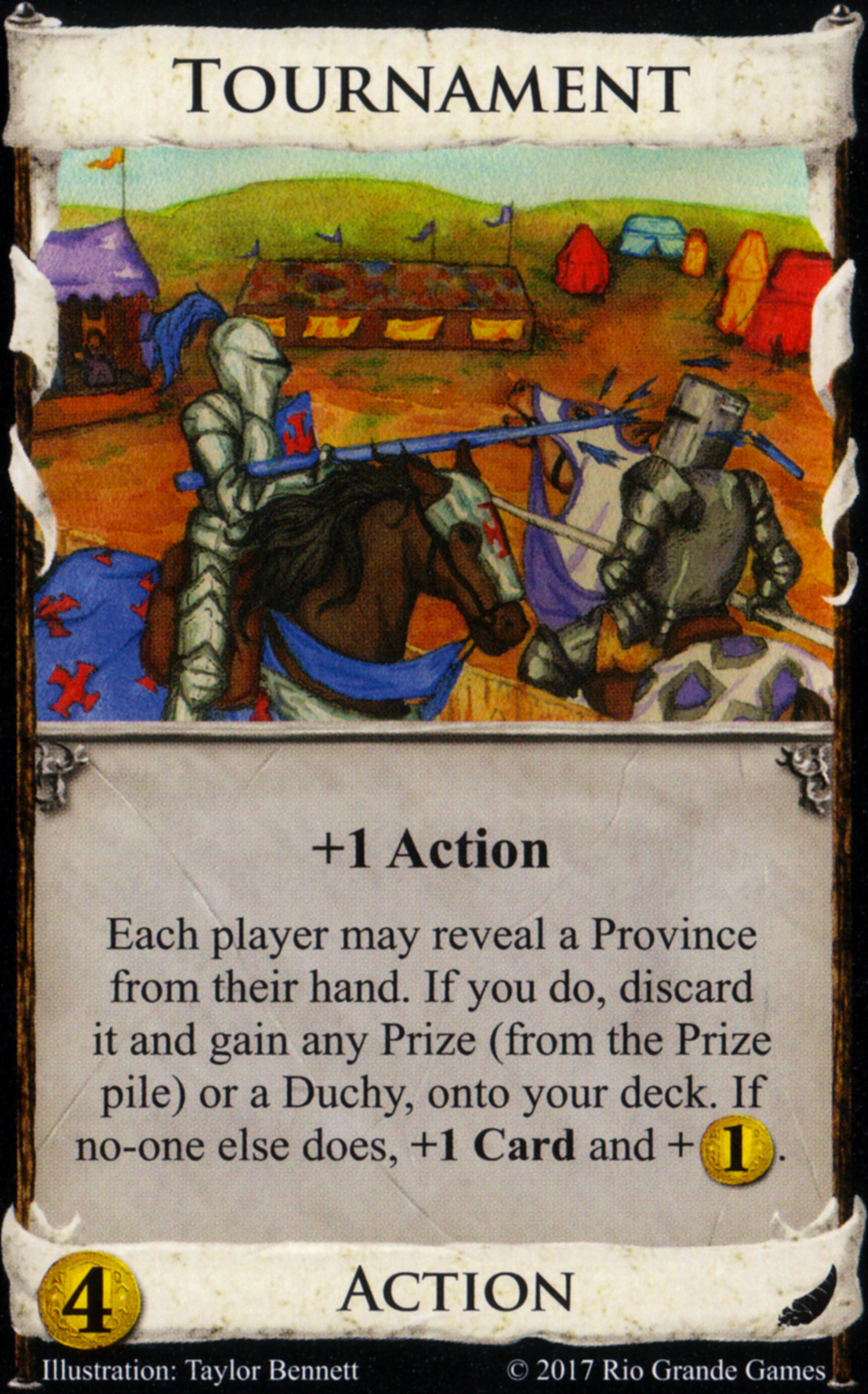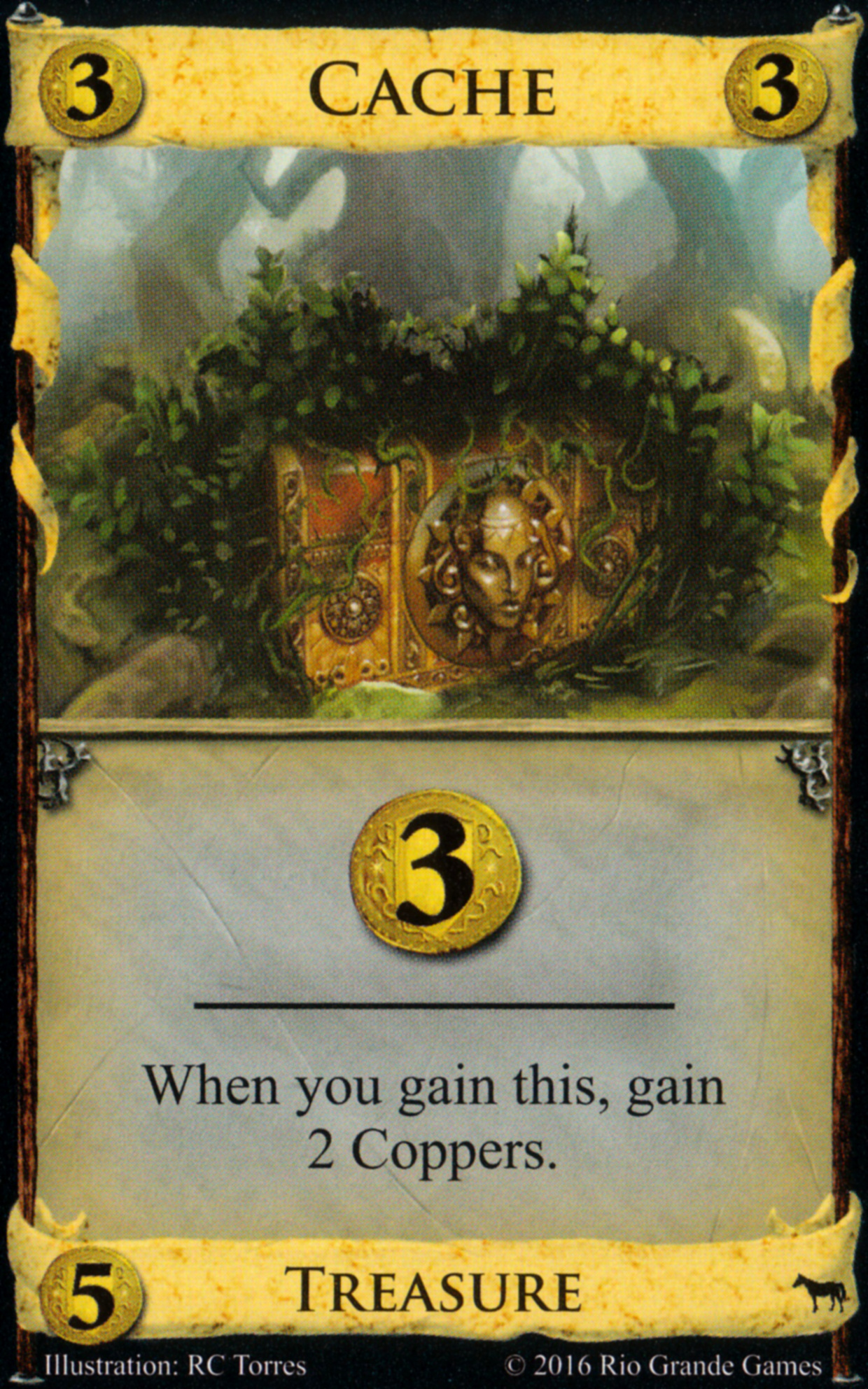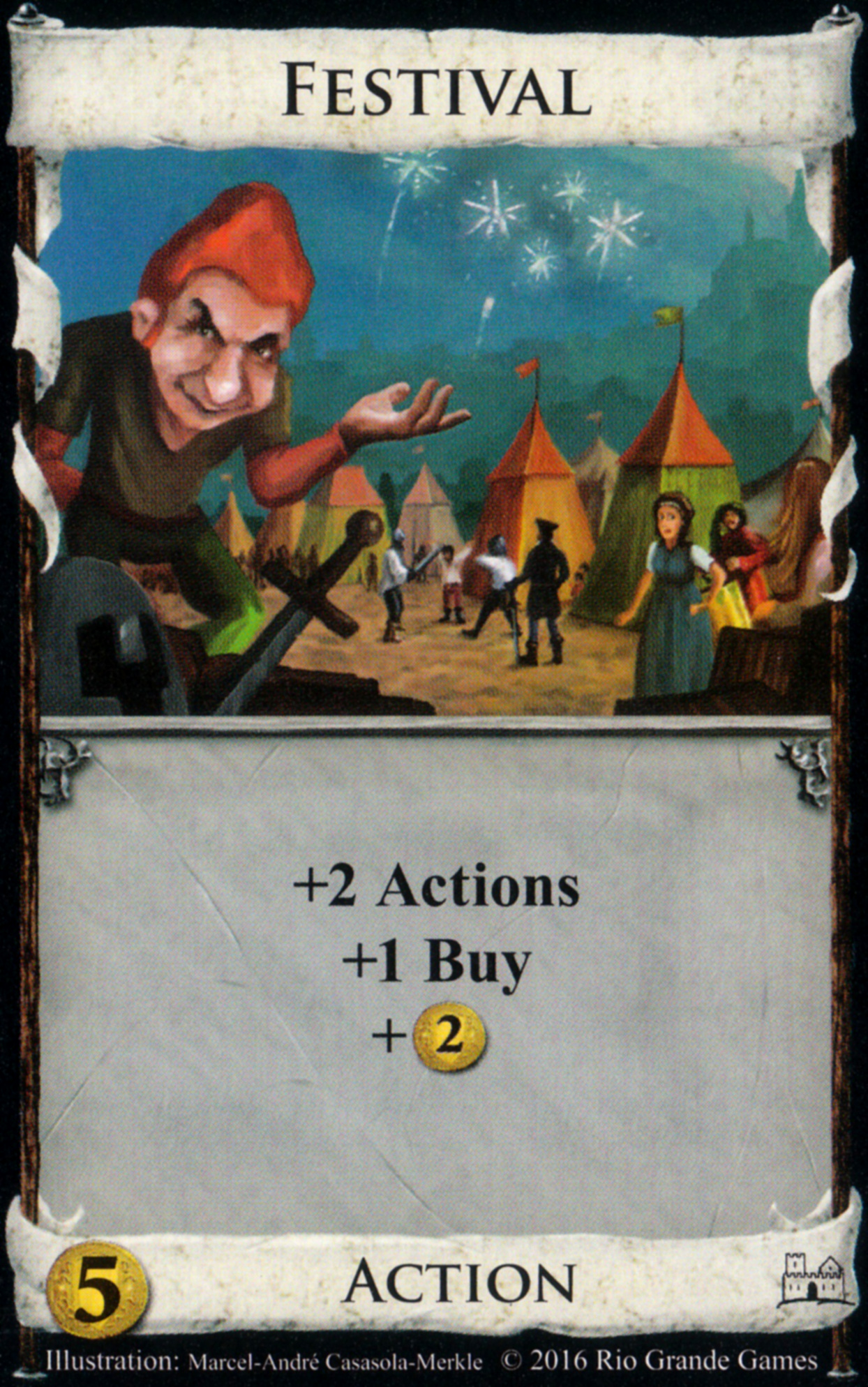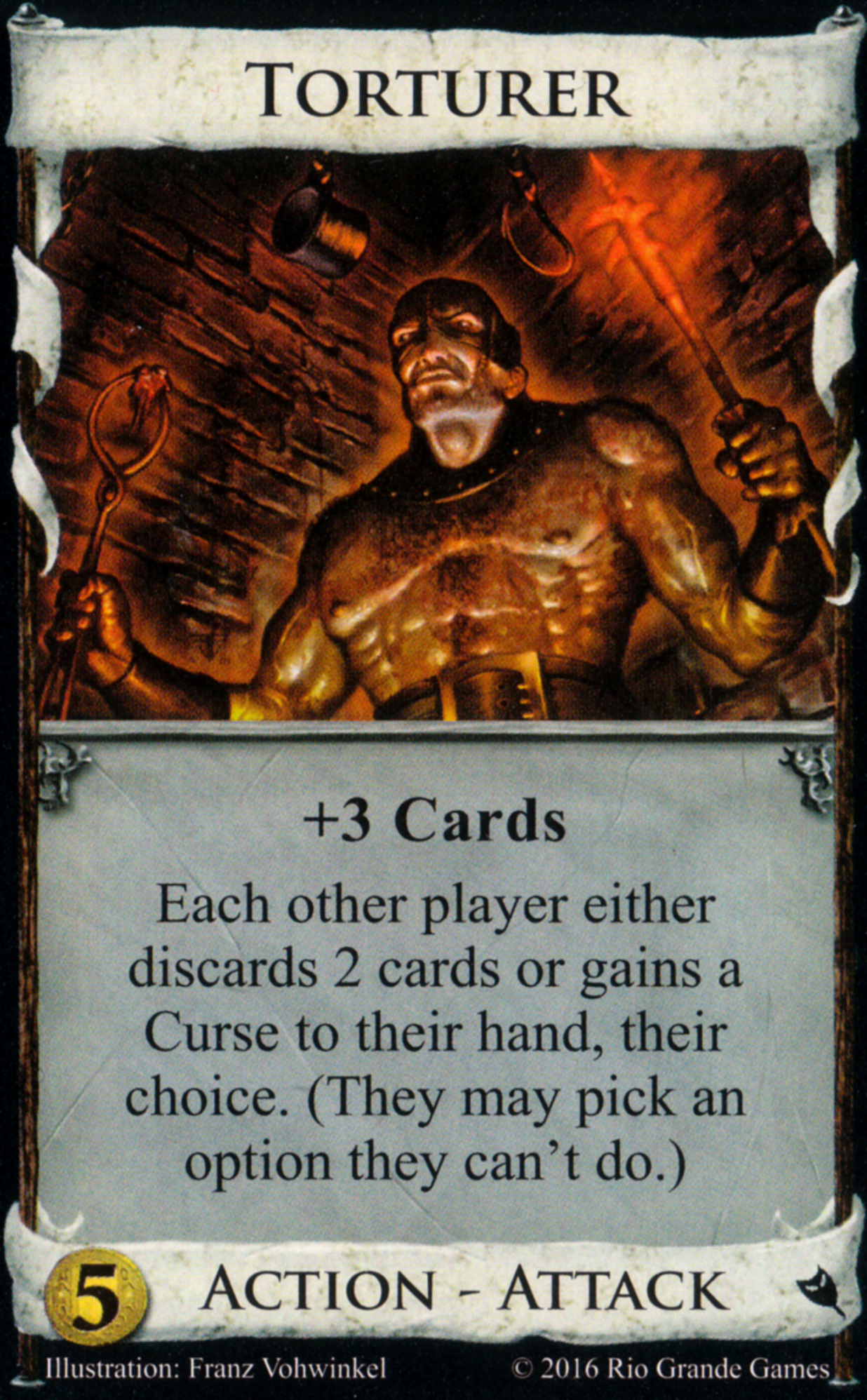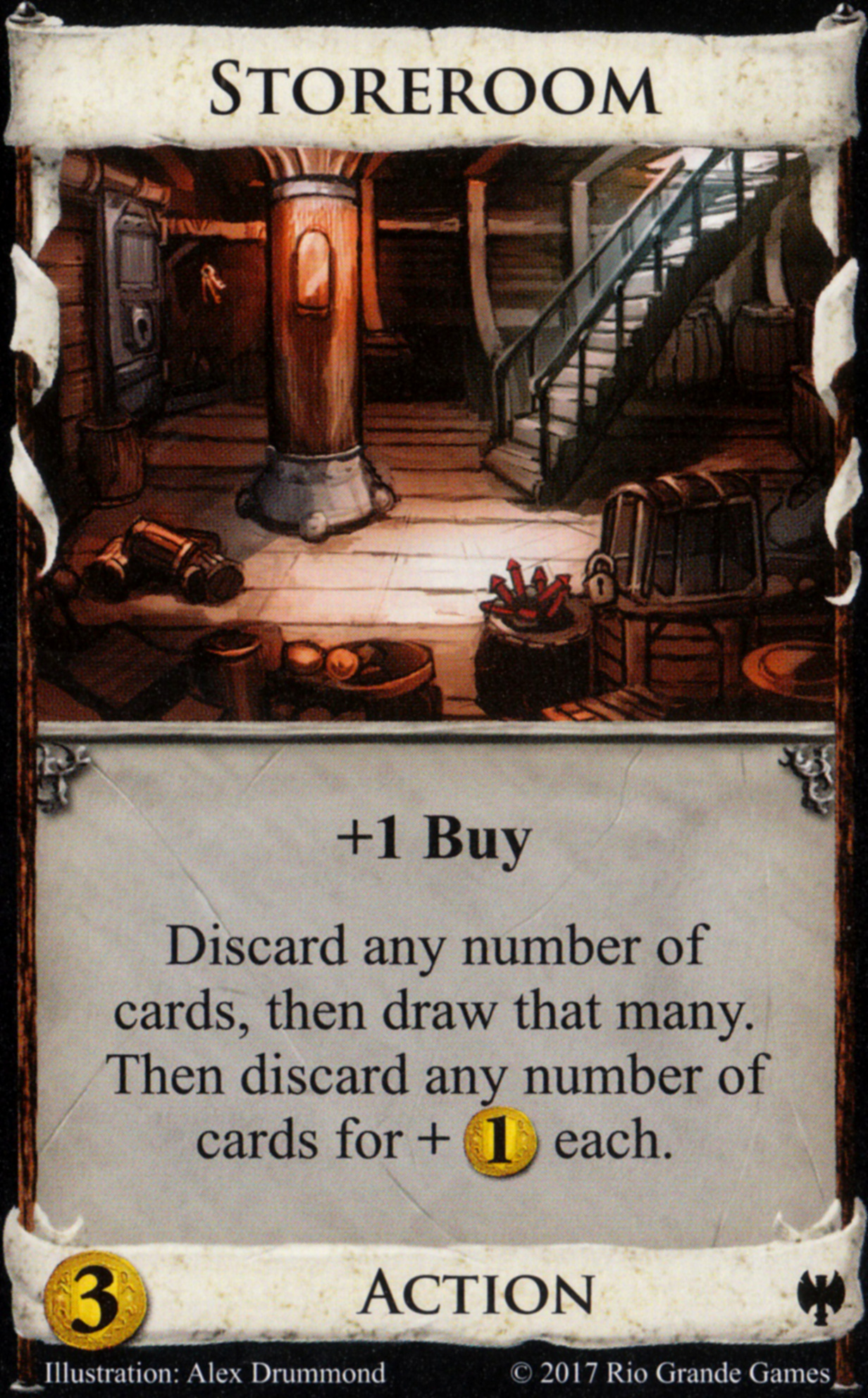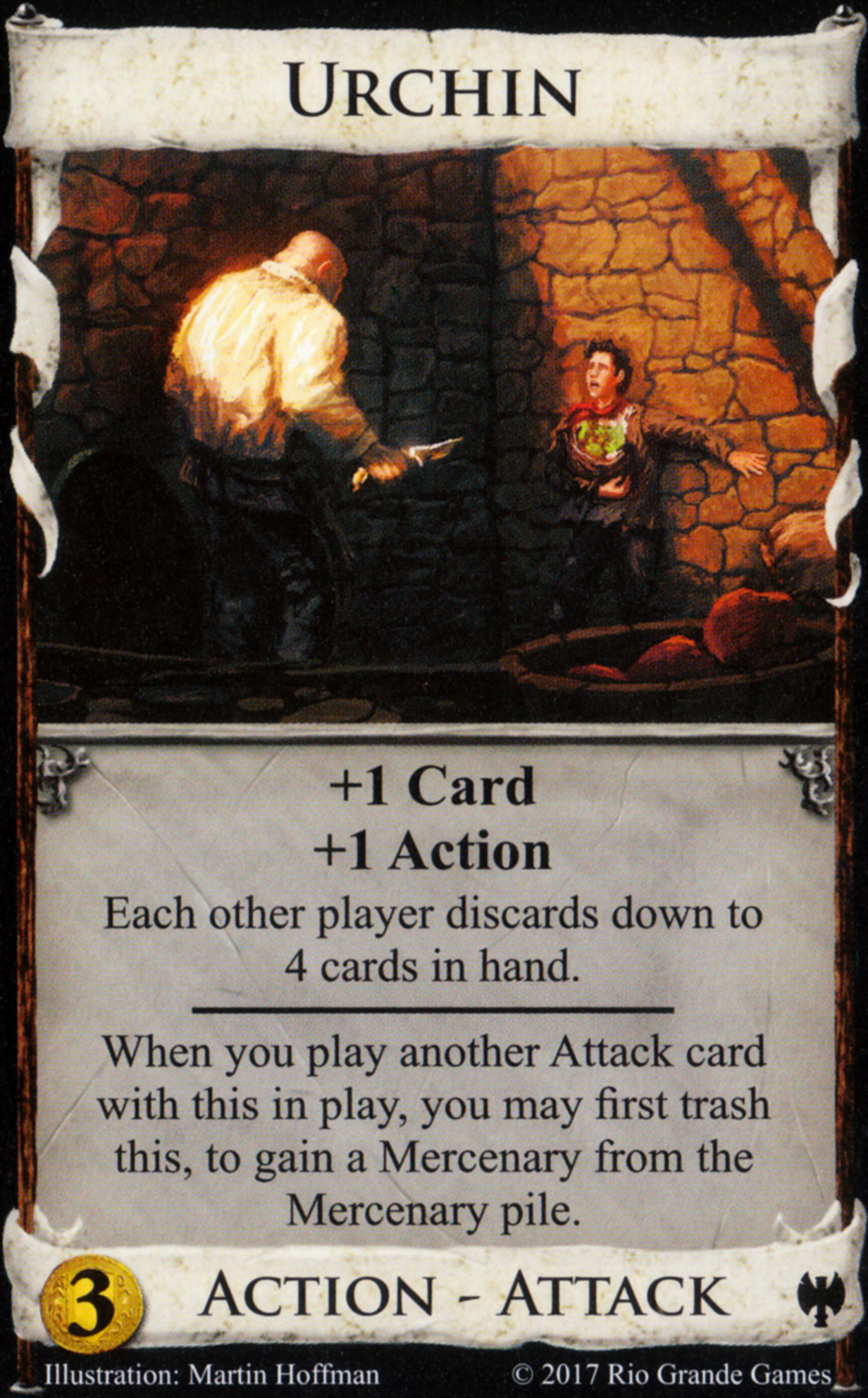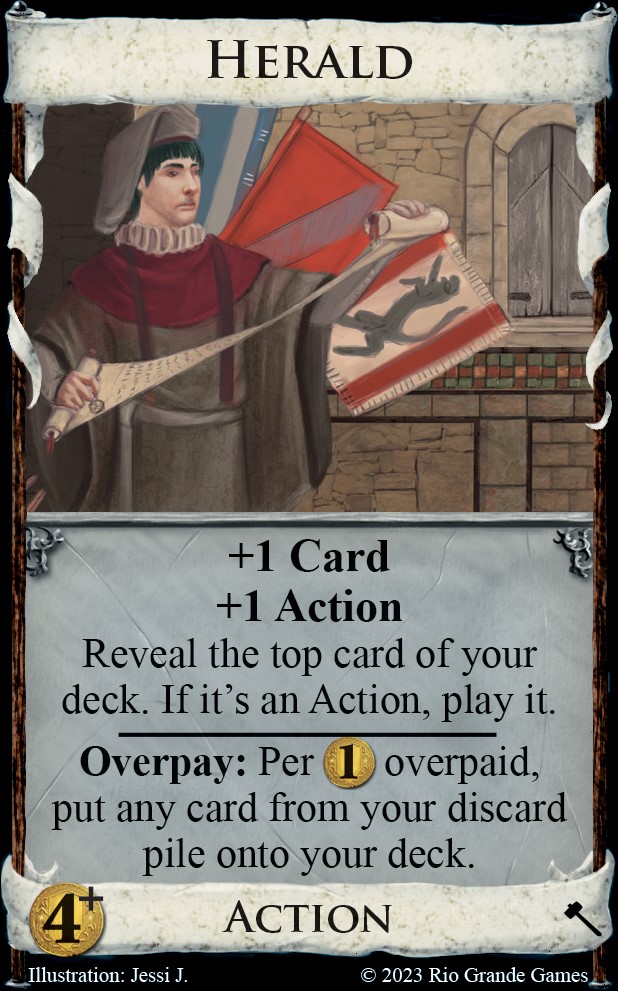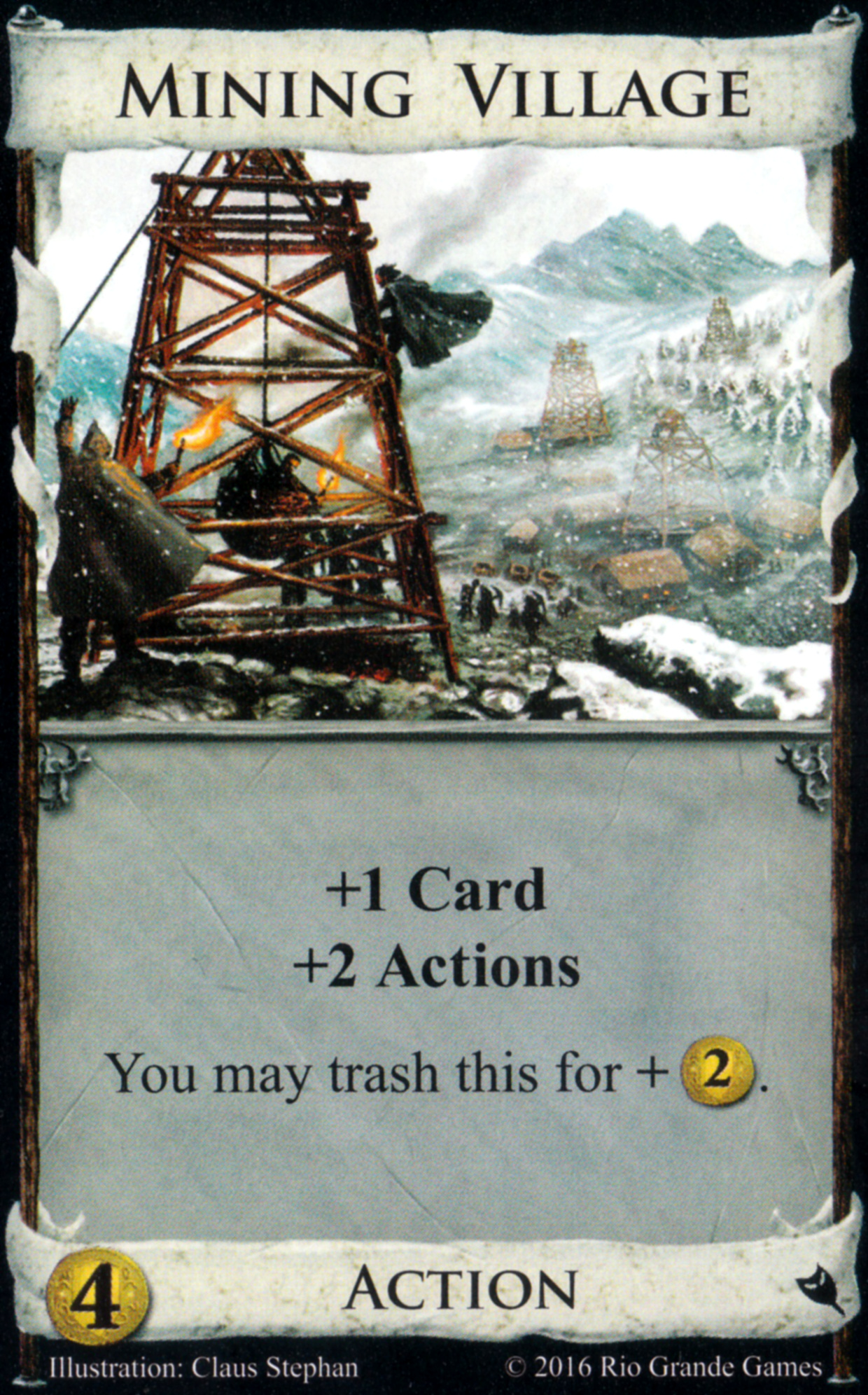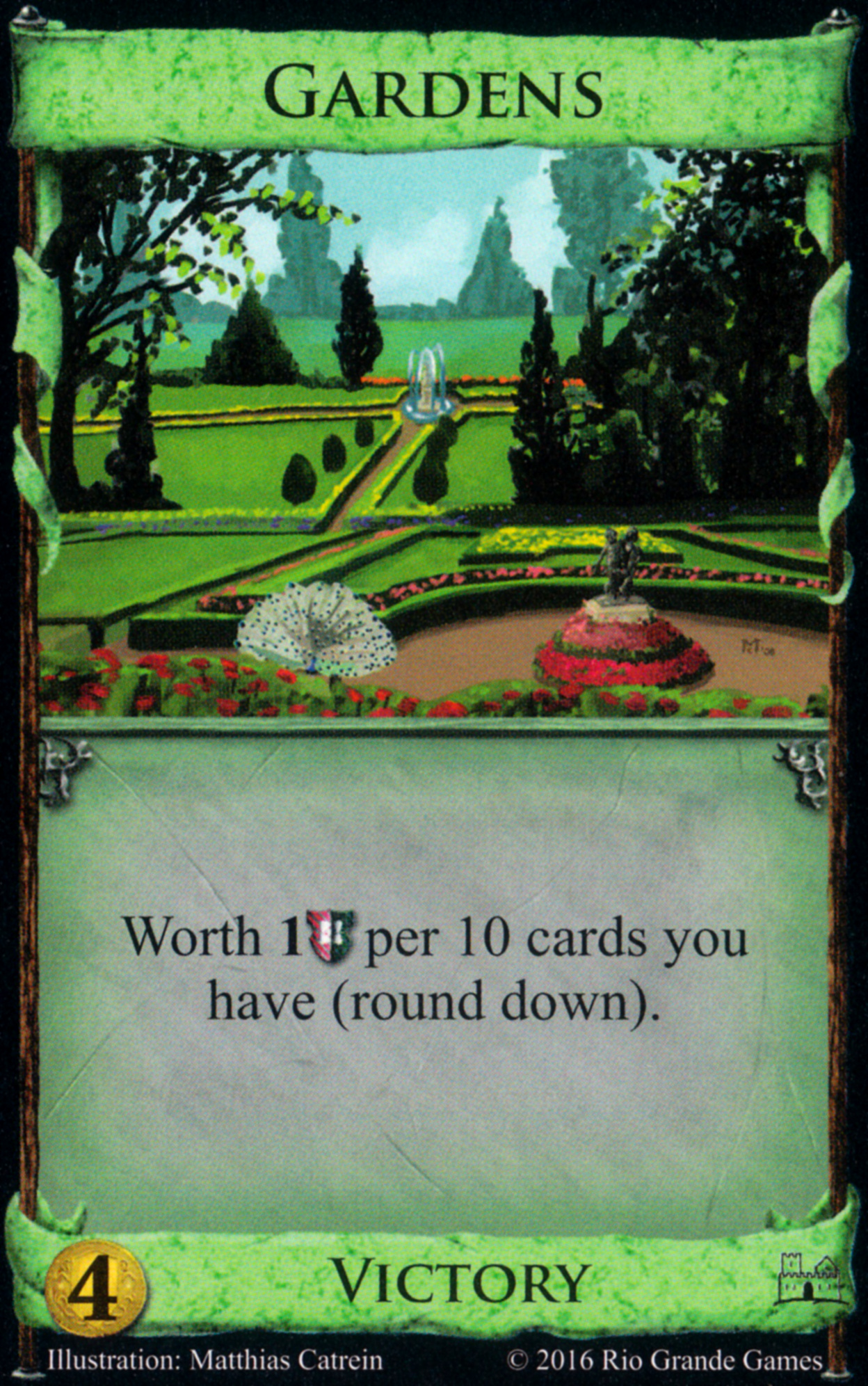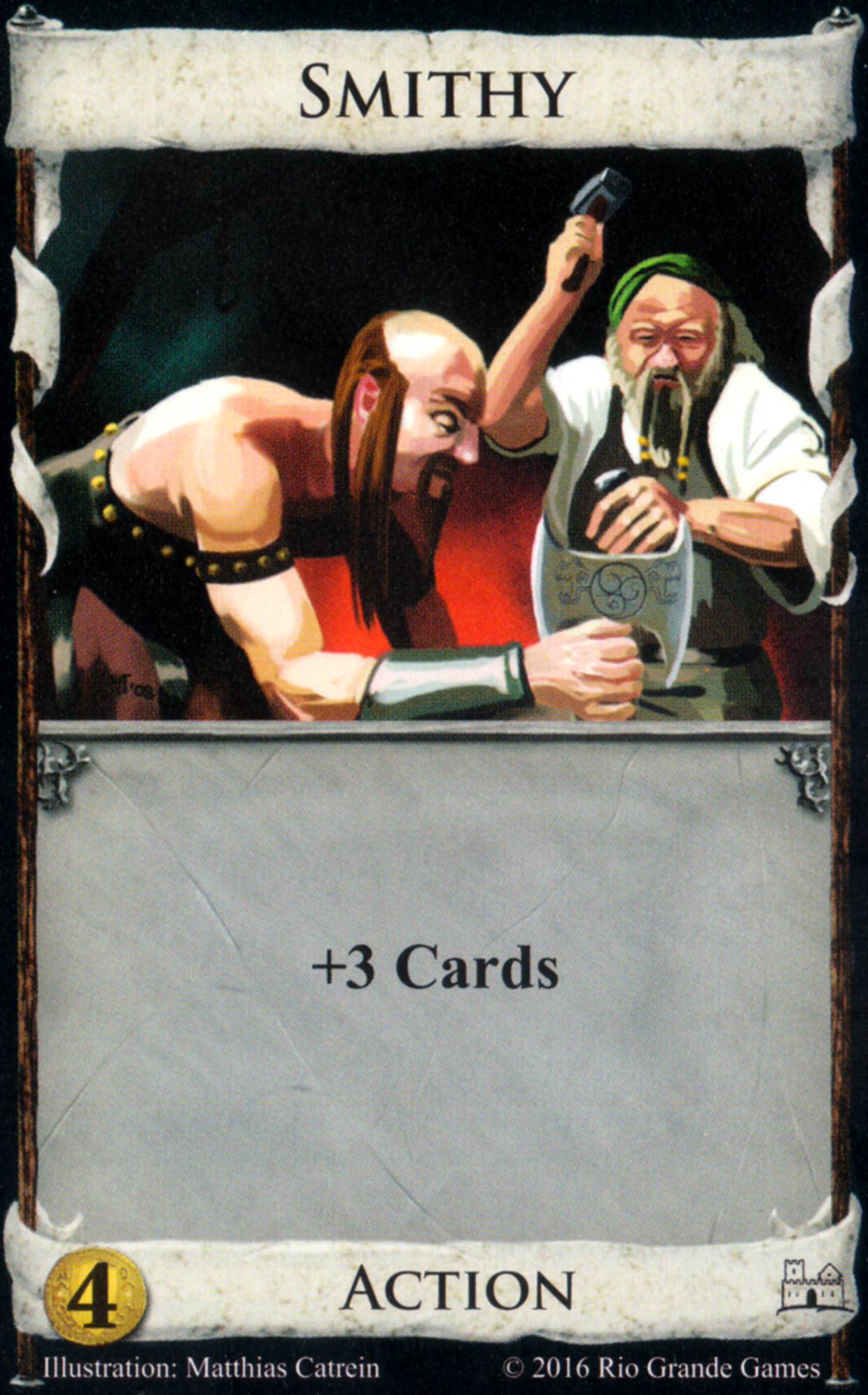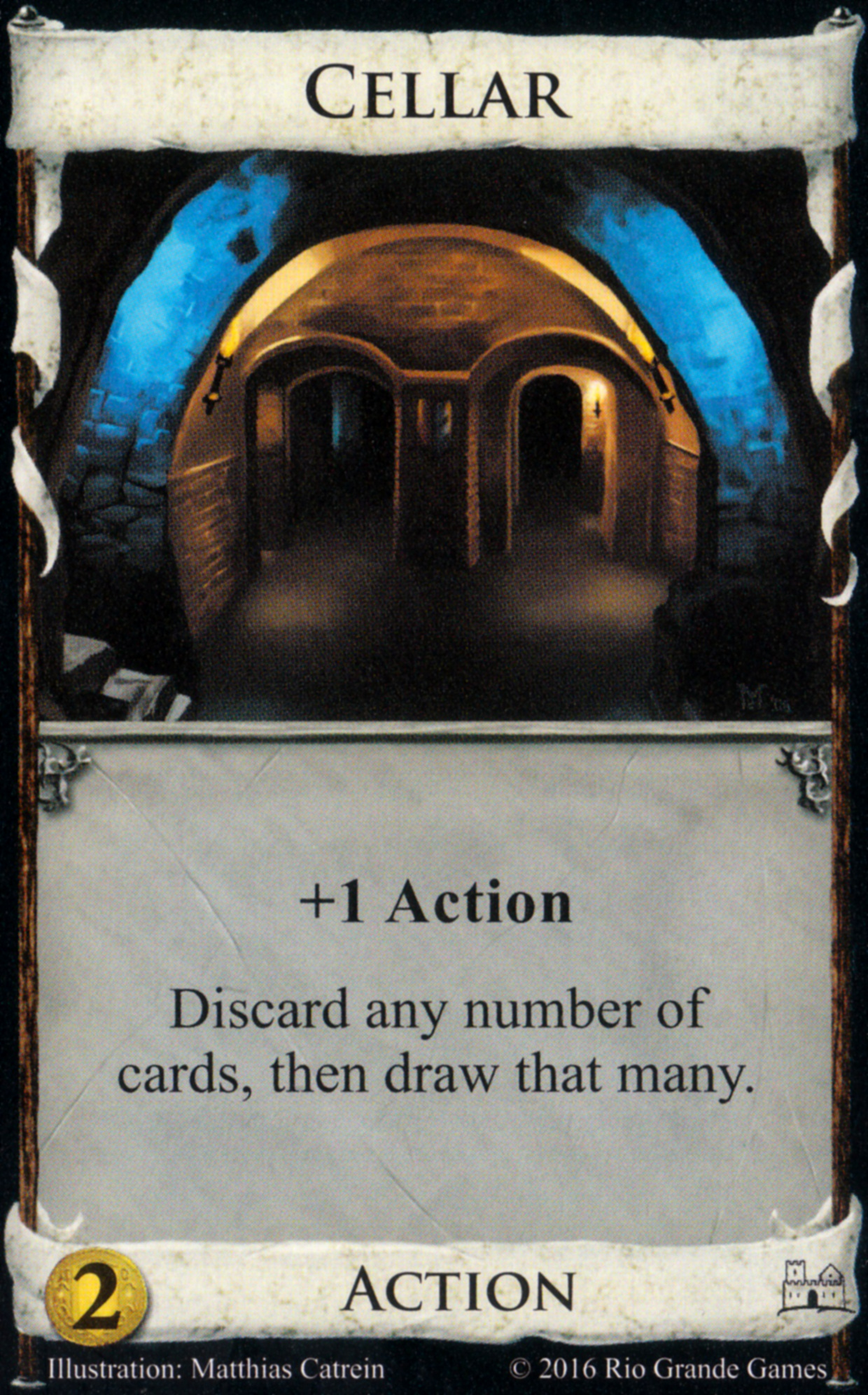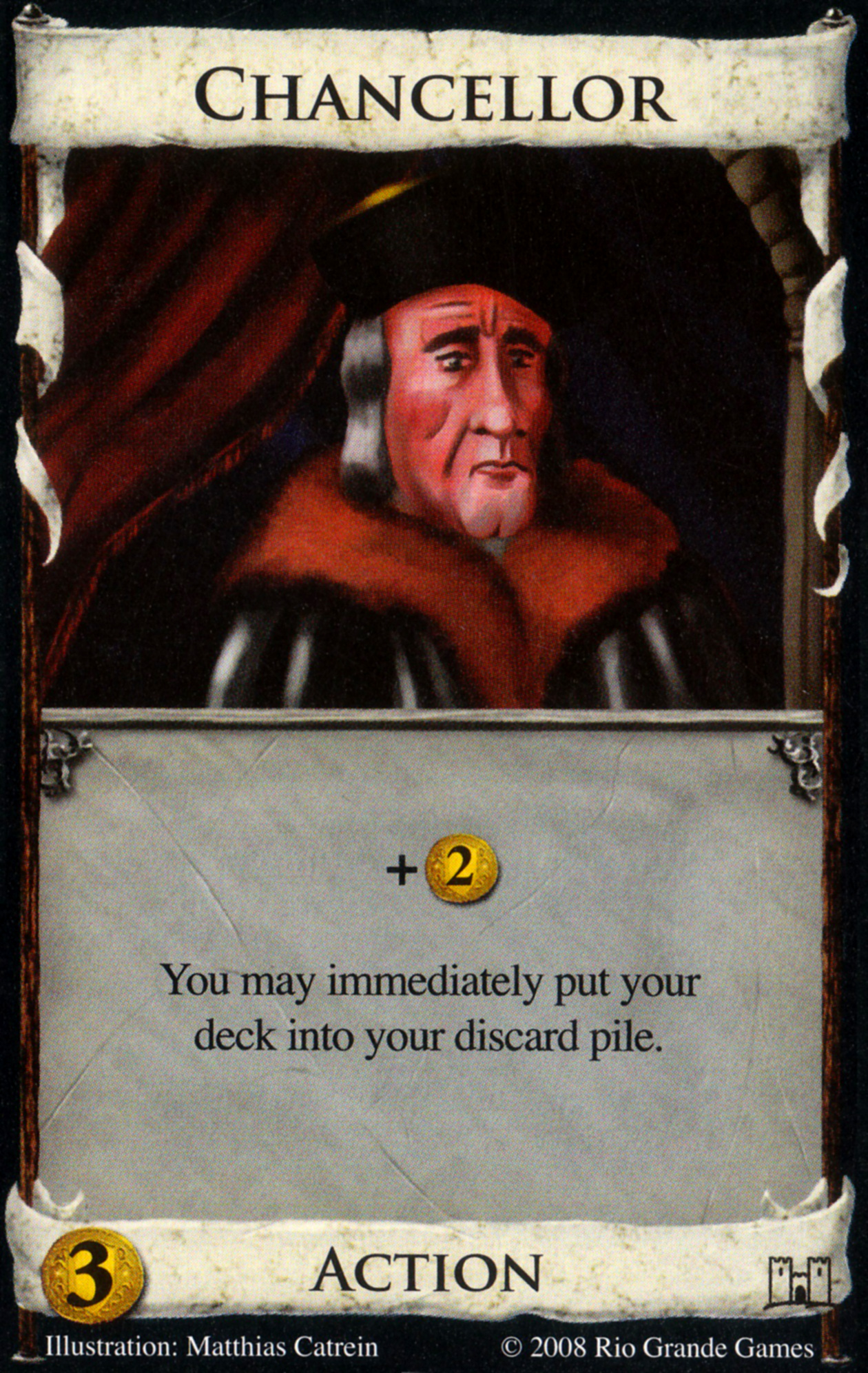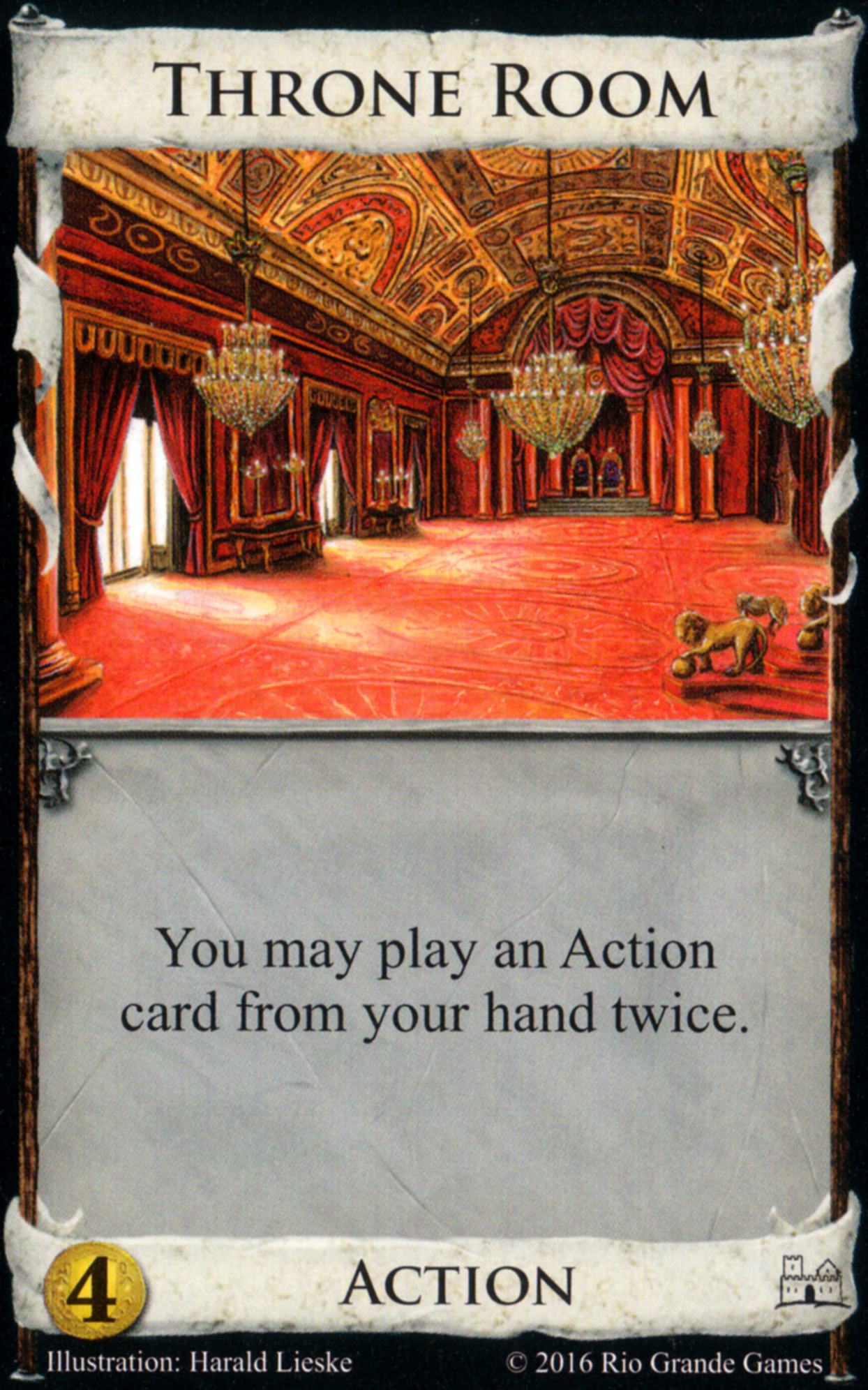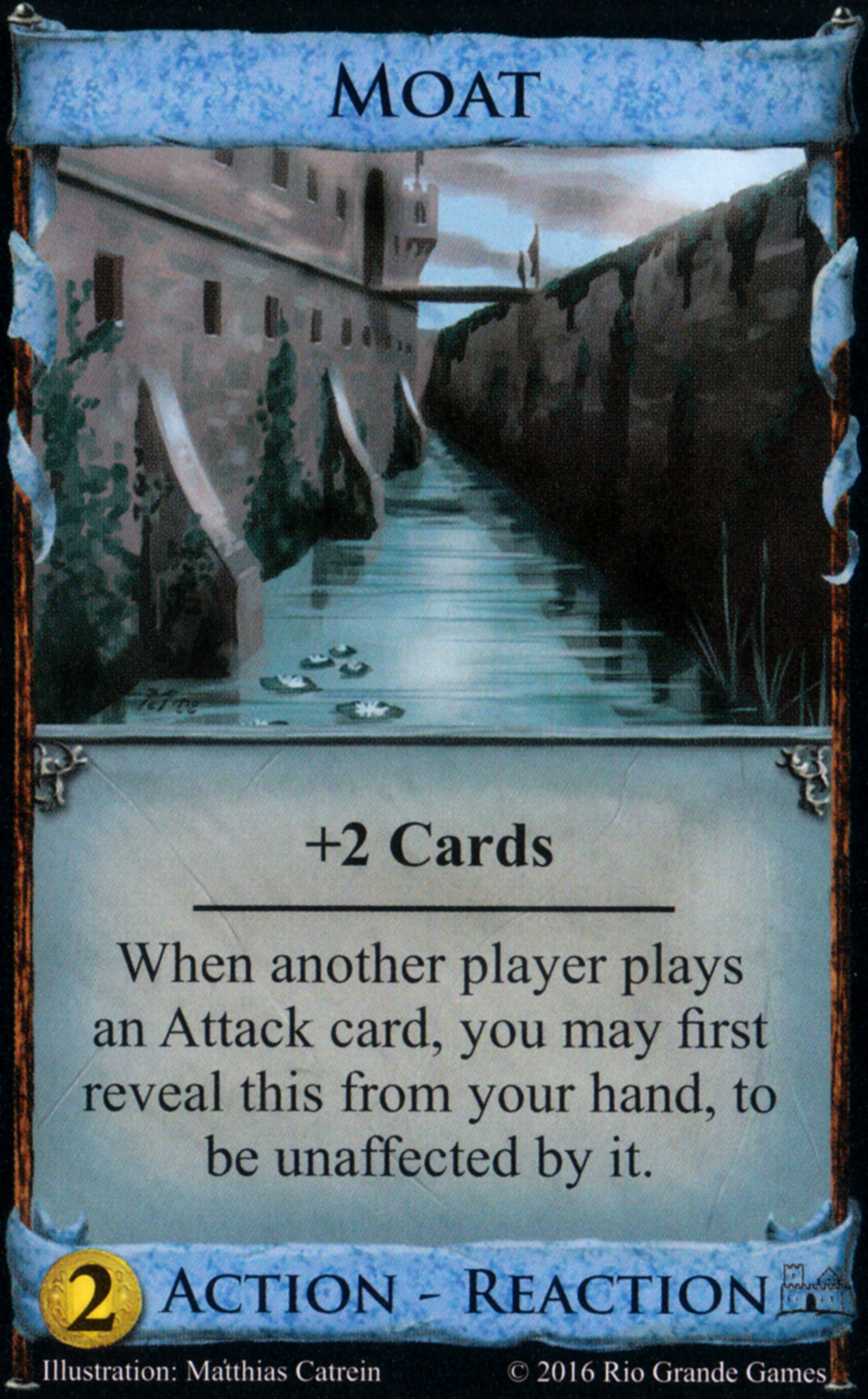26
Dominion Articles / How Do I Hit $5? An Opening Principle
« on: October 11, 2017, 03:39:47 am »
Stream of consciousness article. Might polish this later if I have time. I was just in an article-writing mood.
Costs in Dominion work out roughly like this.
$2: Always openable, players might want a lot of these, competes with Silver.
$3: Always openable, can open with 2 of these on 4/3, competes with Silver.
$4: Always openable, competes with Silver.
$5: Openable only if you get lucky, competes with Gold.
$6: Not openable except for weird edge cases, competes with Gold.
In practice, because $5 cost Actions compete with Gold, the gap in power between $4 cost Actions and $5 cost Actions is big. Big enough that on several boards, figuring out how you buy a $5 cost is one of the biggest considerations in the opening.
Not all boards are ruled by their $5 cost Actions, but on boards where the $5 costs are important, you need to have a plan for how you're going to buy those $5 costs early. By early, I mean the first 4 turns.
Why the first 4 turns? Barring weird shenanigans, your first reshuffle is right after turn 2, and your 2nd reshuffle is right after turn 4. If you want a $5 cost, you want it by the 2nd reshuffle, just because of how much more powerful they can be. You want them by then because of the cascading effect of Dominion: the better your deck, the better cards you can buy, and in practice $5 cost Actions are often very good at helping you buy more $5 Cost Actions.
Why $5 in particular? In practice it's difficult to get good guarantees of hitting $6+ before turn 4. There also simply aren't that many $6 cost Actions in the game.
----------------------------------------------------------------------------------------------------------
In the first 4 turns of the game, it's tricky to get more than 5 cards in your hand, and most of your sources of money are Copper. This limits how many ways you have to get to $5. Here are the broad ways you can get there.
1. Draw 5 Coppers
With 3 Estates in your starting deck, it's hard to draw 5 Copper. Usually, this happens by pure luck. Sometimes, you open a card like Smithy or Oracle, to get more than 5 cards in your hand.
2. Draw 3 Coppers and a card that gives $2
The "card that gives $2" can be Silver, or a terminal Silver like Fortune Teller or Swindler, or Mill discarding 2 cards, or even Salvager + Estate. This is a common way people aim for $5, because it's fairly safe and flexible.
3. Draw 1 Copper, 1 Silver, and a card that gives $2 (Silver or terminal Silver)
This is the safest option, because if you don't hit this option, you have good odds of hitting Silver + 3 Copper anyways.
3. Draw 4 Coppers, get $1 from something else
The "something else" could be the +$1 from Poacher, or the Duration effect of Lighthouse, or a saved coin token from Candlestick Maker. Note the last 2 options require drawing Lighthouse / Candlestick Maker on turn 3, so that the +$1 effect happens on turn 4. So again, not something you can count on. Poacher/Silver and Tournament/Silver, however, are tried-and-tested openings. Compared to Silver/Silver or Silver/terminal-Silver, they trade off a slightly lower chance of hitting $5 for the upside of having 1 fewer Silver / terminal in the deck.
4. Horse Traders
Horse Traders + 2 Copper = $5. Opening Horse Traders almost always guarantees hitting $5, except for exceptionally unlucky scenarios.
5. Expedition
An early Expedition can be worth it over buying a Silver when it comes to hitting $5.
I'm most likely forgetting a few cases, but the key principle is figuring out how to count to $5 when most of your deck is Coppers and Estates. Everything else follows from that.
The cards you buy on turns 1 and 2 influence which paths you can take. If you don't buy a Silver, or a terminal Silver, and don't buy a +Cards action either, then you're stuck with hoping you just draw 5 Copper, which isn't great odds. If you open 1 Silver + a card that doesn't give money (like Silver/Sea Hag or Silver/Remodel), you're hoping you draw Silver + 3 Copper. If you open Silver/terminal-Silver, you get more safety. If you open Silver/Warehouse, you're aiming for Silver + 3 Copper, but can use Warehouse to set it up.
I'm not here to enumerate all the variations, so stepping back a bit, this is roughly how the opening goes.
1. There are some cards you want as early as possible. Trashing effects like Chapel and Steward top this list. Gaining effects like Workshop and Ironworks can also be important if there are important cards that cost $4 or less. Trash-for-benefits like Remodel, Salvager, and Remake are nice to open with because it's easier to collide them with Estate.
2. Those cards usually don't help you hit $5. This pulls you in 2 different directions and forces you to guess at the correct trade-off. A bit of payload now to hit $5, or accept higher risk and buy a card that helps me sculpt my deck?
3. Furthermore, the cards you open with are going to matter for the rest of game. Maybe I don't want 2 Silvers so early! But on the other hand, maybe I really don't want to miss $5! AHHHHH DECISIONS.
3. The correct answer depends on just how important hitting $5 is, the risk-reward of openings with less chance of hitting $5, and your personal risk tolerance.
4. No one has all the answers, so it's on you to make the call.
5. Welcome to Dominion.
------------------------------------------------------------------------------------------------------------------------------------------------------------
Examples:
I generated these by picking a few random boards. Assume I always open 3/4.

It's hard to care a lot about hitting $5 if there are no $5 costs to buy.

Governor, Cultist, and Upgrade are all great $5 costs. Workshop has lots of great targets (Scheme, Conspirator, Magpie). No +Actions means you need to be pretty careful. This is a tricky board and I'm not sure what I'd open, but for sure I'm buying at least one of Silver, a Conspirator, or Horse Traders. Missing $5 is pretty bad here. You can definitely still win if you don't hit $5, but it gets a lot harder.

Here, $5 is pretty important, because it gets you Council Room, Bridge Troll, and Crowns. The end-goal is to play a ton of Bridge Trolls. I would open Ironmonger/Silver or Transmogrify/Silver, more likely on Ironmonger. Transmogrify is secretly a way to get $5 if you're lucky, because you can transform Estate into Silver in your hand which gets you $2. That being said, it takes a bit of time to do this, and given that I want $5 early, I think Ironmonger is the better open.

Here, you want Giants eventually, but you don't need it right away. Your main draw is going to be Rangers and Masquerade backed up by Fishing Village, so you can focus on the $3 and $4 costs and pick up a Giant or 2 later. (This is in some ways similar to the First Game engine: you mostly want Village + Smithy, want to pick up a Mine at some point, but don't want to go too far out of your way to get that Mine ASAP.)

This is easily Ironmonger/Silver for me.
Ironmonger/Candlestick Maker: too easy to miss $5.
Silver/Silver: doesn't hit $5 that much more often than Ironmonger/Silver and having an Ironmonger instead of a Silver is way better long run.
Costs in Dominion work out roughly like this.
$2: Always openable, players might want a lot of these, competes with Silver.
$3: Always openable, can open with 2 of these on 4/3, competes with Silver.
$4: Always openable, competes with Silver.
$5: Openable only if you get lucky, competes with Gold.
$6: Not openable except for weird edge cases, competes with Gold.
In practice, because $5 cost Actions compete with Gold, the gap in power between $4 cost Actions and $5 cost Actions is big. Big enough that on several boards, figuring out how you buy a $5 cost is one of the biggest considerations in the opening.
Not all boards are ruled by their $5 cost Actions, but on boards where the $5 costs are important, you need to have a plan for how you're going to buy those $5 costs early. By early, I mean the first 4 turns.
Why the first 4 turns? Barring weird shenanigans, your first reshuffle is right after turn 2, and your 2nd reshuffle is right after turn 4. If you want a $5 cost, you want it by the 2nd reshuffle, just because of how much more powerful they can be. You want them by then because of the cascading effect of Dominion: the better your deck, the better cards you can buy, and in practice $5 cost Actions are often very good at helping you buy more $5 Cost Actions.
Why $5 in particular? In practice it's difficult to get good guarantees of hitting $6+ before turn 4. There also simply aren't that many $6 cost Actions in the game.
----------------------------------------------------------------------------------------------------------
In the first 4 turns of the game, it's tricky to get more than 5 cards in your hand, and most of your sources of money are Copper. This limits how many ways you have to get to $5. Here are the broad ways you can get there.
1. Draw 5 Coppers
With 3 Estates in your starting deck, it's hard to draw 5 Copper. Usually, this happens by pure luck. Sometimes, you open a card like Smithy or Oracle, to get more than 5 cards in your hand.
2. Draw 3 Coppers and a card that gives $2
The "card that gives $2" can be Silver, or a terminal Silver like Fortune Teller or Swindler, or Mill discarding 2 cards, or even Salvager + Estate. This is a common way people aim for $5, because it's fairly safe and flexible.
3. Draw 1 Copper, 1 Silver, and a card that gives $2 (Silver or terminal Silver)
This is the safest option, because if you don't hit this option, you have good odds of hitting Silver + 3 Copper anyways.
3. Draw 4 Coppers, get $1 from something else
The "something else" could be the +$1 from Poacher, or the Duration effect of Lighthouse, or a saved coin token from Candlestick Maker. Note the last 2 options require drawing Lighthouse / Candlestick Maker on turn 3, so that the +$1 effect happens on turn 4. So again, not something you can count on. Poacher/Silver and Tournament/Silver, however, are tried-and-tested openings. Compared to Silver/Silver or Silver/terminal-Silver, they trade off a slightly lower chance of hitting $5 for the upside of having 1 fewer Silver / terminal in the deck.
4. Horse Traders
Horse Traders + 2 Copper = $5. Opening Horse Traders almost always guarantees hitting $5, except for exceptionally unlucky scenarios.
5. Expedition
An early Expedition can be worth it over buying a Silver when it comes to hitting $5.
I'm most likely forgetting a few cases, but the key principle is figuring out how to count to $5 when most of your deck is Coppers and Estates. Everything else follows from that.
The cards you buy on turns 1 and 2 influence which paths you can take. If you don't buy a Silver, or a terminal Silver, and don't buy a +Cards action either, then you're stuck with hoping you just draw 5 Copper, which isn't great odds. If you open 1 Silver + a card that doesn't give money (like Silver/Sea Hag or Silver/Remodel), you're hoping you draw Silver + 3 Copper. If you open Silver/terminal-Silver, you get more safety. If you open Silver/Warehouse, you're aiming for Silver + 3 Copper, but can use Warehouse to set it up.
I'm not here to enumerate all the variations, so stepping back a bit, this is roughly how the opening goes.
1. There are some cards you want as early as possible. Trashing effects like Chapel and Steward top this list. Gaining effects like Workshop and Ironworks can also be important if there are important cards that cost $4 or less. Trash-for-benefits like Remodel, Salvager, and Remake are nice to open with because it's easier to collide them with Estate.
2. Those cards usually don't help you hit $5. This pulls you in 2 different directions and forces you to guess at the correct trade-off. A bit of payload now to hit $5, or accept higher risk and buy a card that helps me sculpt my deck?
3. Furthermore, the cards you open with are going to matter for the rest of game. Maybe I don't want 2 Silvers so early! But on the other hand, maybe I really don't want to miss $5! AHHHHH DECISIONS.
3. The correct answer depends on just how important hitting $5 is, the risk-reward of openings with less chance of hitting $5, and your personal risk tolerance.
4. No one has all the answers, so it's on you to make the call.
5. Welcome to Dominion.
------------------------------------------------------------------------------------------------------------------------------------------------------------
Examples:
I generated these by picking a few random boards. Assume I always open 3/4.

It's hard to care a lot about hitting $5 if there are no $5 costs to buy.

Governor, Cultist, and Upgrade are all great $5 costs. Workshop has lots of great targets (Scheme, Conspirator, Magpie). No +Actions means you need to be pretty careful. This is a tricky board and I'm not sure what I'd open, but for sure I'm buying at least one of Silver, a Conspirator, or Horse Traders. Missing $5 is pretty bad here. You can definitely still win if you don't hit $5, but it gets a lot harder.

Here, $5 is pretty important, because it gets you Council Room, Bridge Troll, and Crowns. The end-goal is to play a ton of Bridge Trolls. I would open Ironmonger/Silver or Transmogrify/Silver, more likely on Ironmonger. Transmogrify is secretly a way to get $5 if you're lucky, because you can transform Estate into Silver in your hand which gets you $2. That being said, it takes a bit of time to do this, and given that I want $5 early, I think Ironmonger is the better open.

Here, you want Giants eventually, but you don't need it right away. Your main draw is going to be Rangers and Masquerade backed up by Fishing Village, so you can focus on the $3 and $4 costs and pick up a Giant or 2 later. (This is in some ways similar to the First Game engine: you mostly want Village + Smithy, want to pick up a Mine at some point, but don't want to go too far out of your way to get that Mine ASAP.)

This is easily Ironmonger/Silver for me.
Ironmonger/Candlestick Maker: too easy to miss $5.
Silver/Silver: doesn't hit $5 that much more often than Ironmonger/Silver and having an Ironmonger instead of a Silver is way better long run.

